#my parents are boomers born in 1961
Explore tagged Tumblr posts
Note
How do you deal with casual ageism in online forums? I'm a late Boomer (born 1961--61 years old). I participate in Reddit and several Discord chat servers which seem to be majority Millennials. Occasionally the subject will turn to how awful Boomers are. I never quite know what to say. I dislike online conflict, I don't want to be a scold, and I don't want to get into an argument when all I want to do is have a fun conversation. Maybe I should just jump in and say, "I'm sorry that your parents/family/coworkers are jerks but it's wrong to stereotype people by age, just as it's wrong to do so by gender, sexual orientation, race, or ethnicity." How do you handle this kind of thing?
Your concerns are legitimate. You don’t want to sound finger-waggy, few of us appreciate being called on bad behavior, and online comment threads can bring out the worst in people. That said, there’s nothing “casual” about being discounted or discriminated against. Most people don’t realize these comments are harmful, but that doesn’t let them off the hook.
It’s always a good idea to start from a place of the ignorance you once shared. I’m guessing that like the younger members of these forums, there was a time when you didn’t notice ageist comments—or even realize ageism was a thing. Say so. Explain that you’ve since learned that age stereotypes are no more acceptable than racial or gender stereotypes. That ageism is indeed a thing, and it affects all ages. Perhaps suggest a look at my TED talk, which introduces these ideas.
Be prepared for pushback: confronting internalized bias is uncomfortable, and trolls gonna troll. Others will appreciate your perspective, even if they don’t say so. Every exchange, no matter how small it may seem, moves the needle. If we stay silent, on the other hand, nothing changes.
7 notes
·
View notes
Text
Facebook 1
Link
(Apollo's Fire Orchestra)
Very talented solo playing! I live here and would like to attend your orchestra. I was supposed to join one. I heard of you in Orlando long ago and came back to Cleveland a 3rd, 4th, and 5th time! I lived 5 places here as an adult other than other states for college, including Oberlin (summer) and Baldwin-Wallace (Methodist conservatory of music) in Fall 2005. I've done music in a group since age 7 most every year until college, as a major. I started myself at age 5. I mostly like classical, Renaissance instrumental and singing, and some Baroque music, otherwise sacred music (fake book,) musical theater, Andrew Lloyd Webber, etc. I also am a singer and studied in college. I followed a Baroque orchestra in Germany online every day almost since April 2016. I attended the concerts of an orchestra called the Bach Festival Society, and it is a Baroque orchestra. It is at my younger brother's Undergraduate and mom's Graduate college. So, I had 4 private violin teachers,. Maybe, one 1st violinist of the orchestra was Baltic with a Latino husband, who maybe.was the other 1st violinist. I loved the tea and scones tiny presentations, maybe with members not of the area. So, I went to the children program and had a private violin teacher for maybe 45 minutes or 1 hour, so I would have time to chat, and she was from Poland and also lived in Spain and somewhere else in the US. So, this was Orlando. I had her for maybe 2 years. After awhile, she didn't want to teach me the other positions, and I never even played fast, except of course sight reading. My sub said I was the best sight reader she's seen, think she was German from her dad and had a piano teacher mom, with maybe 2 or 3 sons, I think age 50. I did major in violin one semester online at The Baptist College of Florida on the Northern border. So, your playing reminds me a lot of my Polish violin teacher, think she's a Late Baby Boomer born in 1961. So, that's what I wanted to say. Sorry, if my post is long, but I just wanted to talk about some things about music and say hello! I did attend one concert when I moved here a 3rd time and have a video meeting a nice Asian boy violinist in the orchestra, 2021. I've been busy settling since my parents died, unfortunately, didn't get my money from the military or a car. It reminds me of music at BW: where I took theory (2 classes,) history, private singing, conducting, choir, singing diction/accents. I was supposed to take dance but couldn't find the building and left early due to my health. Thanks for the nice post and enjoyed your online content! 😁
0 notes
Text
"Fitting In" and "Standing Out" 🏜
Why is Tim Burton with such high expectations? I "know" him from his culture. I was just surprised how California/L.A. makes its kids admit they're "not good enough." 😖 It's not going to catch on, since it's a deliberate, premeditated failure. Like Generation X is the failure or later ones do it. "Oh, come on," you needed your parents, too, you know that very well, especially in America you probably are not that independent. Like, what? the platinum blonde girl goes to him? who else? Who wants the goldies? from Generation XY? Tim Burton is indicative and representative of the late 1990s culture. He's also the art "geek?" sometimes but also a great artist, to me, actually, and hopefully to many a catching eye, like noticing a great classical music performance. He's a great personality for modern culture, as well. He has a great following.
Still, why can't I co-exist with Late Baby Boomers who are not just the skinny cowboys? I can imagine sitting at a table with them, sitting tall and proud. My mom probably chased their hormones. You know, the fat women born around 1961 think I don't matter because I'm a mixed race personality. I can't even be "on the same page." I'm lonely.
0 notes
Text
random thought i had in the shower but: what do you think severus thought of women? and i don’t mean what he thought of them in a romantic way. i mean...do you think he was progressive in his mindset, or do you think he shared a similar mindset with the bulk of his generation (lol snape is a boomer...i will never not find that funny) which viewed men as the superior gender?
(disclaimer that i only mean this discourse in a purely academic sense and i’m deliberately not trying to project my own beliefs onto him; i just want to approach it from his character’s pov based on what we know and can deduce from canon.) my take is: given his background and the environment and time period he had grown up in, it was likely the latter, although i don’t think he would have been as overt in showing it. he was himself an easy target and would have learned to keep his mouth shut early in life, but i bet that there had been instances growing up when he’d told lily she couldn’t do certain things because she was a girl, or when he’d bristled whenever she teased him that he looked/threw/ran like a girl. i bet there were moments growing up when tobias degraded him because he hadn’t deemed his son “masculine enough”. i bet that a lot of the time the marauders had bullied him, mcgonagall had given slughorn the “boys will be boys” excuse within earshot, and snape would have had to begrudgingly accept because no way could he have been seen as less. he was a man and had to take it like a man. there would have been no other recourse. i’d like to think too that he wasn’t so far gone that he thought all women were less important or less intelligent than men. in canon he never made any derogatory remarks about anyone’s gender (that i remember at least, feel free to correct me), and never correlated it with performance and such; he doled out punishments to anyone, after all, and was more concerned about students’ behavior than anything else. he also seemed the type to have known better anyway once he was more grown-up, or at the very least he had known what to say and not say in polite company. we never really know how he interacted with anyone else, especially with peers and colleagues, under normal circumstances though, which is a pity as that would have given us more clues. all in all it doesn’t seem to be so far-fetched that he may have learned and espoused misogynistic beliefs growing up (let’s not even get started on what he thought about lgbtqa+ because i think he’d have been very old-school about that too) but it’s also possible he may have attempted to unlearn it as he got older, or at the very least, learned to restrain his tongue enough to not spread those ideals any further than his own mind. there aren’t a lot of fics that show this side of him...they often write him as a bit progressive, but it’s equally believable, if not more so, that he wasn’t.
#character study#snape the boomer#learned behaviors#misogyny#my parents are boomers born in 1961#their way of thinking about gender is very old-school and rigid#drives me crazy#they try though especially since we've started correcting them#but it's really not work for the faint-hearted#ksjdksjdlskd#snape#hp
251 notes
·
View notes
Text
https://www.youtube.com/watch?v=vqG96vBK3oU
do you want to see the most demented boomer comic experience of your life?
it’s called “What If The 1961 Fantastic Four Origin Story Happened In 2021?”
here are some samples:






boomer comic book guys are the weirdest people alive. they’re deathly afraid of modern comics and basically act like comic books are something that stopped being published after they grew up. they think it’s mega weird that sue storm is now called invisible WOMAN instead of invisible GIRL. some of them, like this guy apparently, are still mad about this name change that happened in the early 80s, literally before i was born.
also in this universe it’s apparently canon that johnny storm has an ex who’s a trans guy. nice. (i am 99% sure that that’s what’s being attempted to communicate here. source: im a trans guy, my dad is a boomer comic book guy, and i have heard how my parents talk about the trans sons and nonbinary children of their friends and acquaintances.)
unfortunately, at the same time sue apparently believes global warming is fake news.
i hope i don’t have to say this, but this is not an invitation to go cyberbully the guy who made this.
1 note
·
View note
Text
i have lots of thoughts about generations discourse but the main points are:
generations are way too large to actually, well, “generalize” anyone’s life experiences. boomers are apparently born from 1946-1964??? my boomer parents (dad born in 1947 and mom in 1952) grew up in a very different political and social climate than later boomers. i have no idea how they are grouped with people who went to college in the 80s? with people who weren’t old enough to remember jfk being shot? can’t remember a time without the beatles, even? makes no sense to me. after being told i had “older” parents my whole life i just find it hard to see people so much younger than them in their generation.
someone’s hometown, class, religious background, race, gender, sexuality, etc. - all of these make for a much better generalization or grouping for a lot of the comments you make about boomers and the like
good lord, not everyone you hate is a boomer lol. biden and bernie are both part of the silent generation. obama is towards the end (1961). trump is towards the beginning (1946).
also, JESUS CHRIST, i have seen people claim boomers fought against civil rights. Um, I’m sure some of the oldest ones were against it, but you know the usa’s civil rights act was signed in 1964? which is apparently the cut-off year for when boomers could be born??? i’m not saying they can’t be racist but the oldest boomers would’ve been 18 when that passed???? many older boomers went to segregated schools because brown v. the board of education, while decided in 1954, didn’t mean everyone integrated schools immediately!!! they could not control that!!
some of you need to just say you hate your parents and move on!!!
3 notes
·
View notes
Text

i’m nougat, endured 20 years on this earth, go by he/him and comin a lil late to the party from central timezone with my darling agony bby in tow and i am SO EX CI TED TO BE HERE honestly pls bring upon me all the plots i’m ready for all ur babes. if you like a delicate, optimistic soul who's had a whole identity crisis, lost their sense of self and thensome—- i have A DEAL FOR YOU BELOW THE CUT. you can peep some pre-written plots here & stats here!
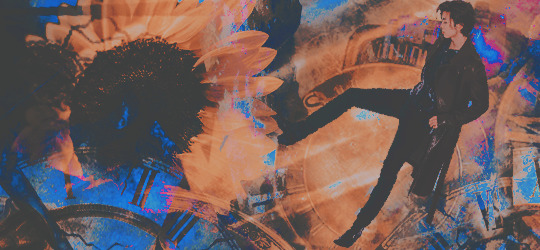
when you picture things that go bump in the night, an immortal being no less, someone who’s a big squishy softie is not what you'd imagine—- but that’s exactly who eden was, at least initially. how they’ve gone from needing a nightlight until they were 14 to a creature of the dark rly requires some backtracking so let’s get to it!
hey isn’t that HAK ‘EDEN’ RYUNMIN, the TWENTY-ONE/FIFTY-NINE year old VAMPIRE that also is an ART RESTORER? i heard they could be LOQUACIOUS but is pretty JADED too. oh, please don’t tell them this but don’t they kind of look like KIM YOUNGKYUN?
tw: parental/familial death ( like.. more than once ;-; )
born in good ol 'straya in devonport on a lovely lil island called tasmania in 1961 to a marine biologist father & seamstress mother. they are settling into a quiet, contemporary life after fleeing their war-torn home country in south korea several years before the birth of their bouncing baby. ryunmin probably would have lived to be a proper gentle soul with a nice, cozy life given how their parents had no shortage of love for each other or them—- only it didn't work out like that, not really.
the untimely passing of min’s mother at 11 puts a screeching halt on the blissful life. their father, wracked with the grief, drops lil ryunmin in the care of their aunt who lives all the way in victoria, bc canada (spoiler alert, he never comes back :/) their aunt has clear bias for her own two sons but she’s a caring woman in her own right. can’t manage to help them with all that grief though. their main solace comes from creating things, a talent they must have inherited from their mother.
they’re on the cusp of 15 when they’re put into foster care after their aunt, already immuno-compromised, had lost her battle with a severe flu and there’s no one else to take care of them. this also means losing their younger brothers along the way. they jump around several foster homes before finally settling into a group home. their warm heart touches the other troubled teens, a willing friend and often spending hours sneaking out to listen to their stories under the stars. a sidewalk surfing teen who got up to some funky fresh adventures and made a ragtag group of friends.
bright-eyed and bushy-tailed @ 19, they’re hopping off on a plane to seoul, their mother’s hometown, in a last ditch effort to kick-start their life on their own terms. WELL. THEY SURE DO EXACTLY THAT but not in a way they’d imagined. they fall in love. head over heels in love with a welsh woman and the rest, they say, is history. she’s a vampire and for a while it’s basically smooth sailing until she’s like ‘be with me forever’ when min is 21 and they are like WOW SURE. bad idea actually cause she leaves them flat on their ass after :/ ( talia i know ur still out there i hope you get drop-kicked while walkin down the street )
the rebirth as eden and kind of a funny homage to where they came from considering the name itself is one talia gave. as far as life as a vampire has gone it’s... messy. fucked off to kazakhstan for several years, did a lot of soul-searching— they can write a goddamn book abt what it’s like to come out of the ashes of yourself so many times. their descent was less like a sudden plateau and more like tip-toeing down a slope and once they lost a foothold they jus.. went tumbling. still probably better off than some mega hag vamps out there in the fact they are very tethered to humanity but hey that’s the way the immortal cookie crumbles
the extras
trying their goddamn best ok.. their cards were not at all groovy or tubular and the whole morality struggle and bout of angst did NOT do them good At All.
still awkwardly struggles with knowing they are not human anymore like ouchie. . it’s a real slap to the face most of the time
literally a boomer and that sends me
really a lot to handle. always been an untamed type, speaks in stream of consciousness & beats to their own drum. will kick ass on a dime.
* regarding pronouns, they don’t mind being called anything and as they are mainly male presenting, he/him is just fine too
#▒ ☼ ❛ I. seek not my heart; beasts have eaten it ┊→ intro !#tw parental death#this is a mess y'all i am so sorry pls forgive#if none of the plots be speakin to your soul we can thunk something up
7 notes
·
View notes
Photo
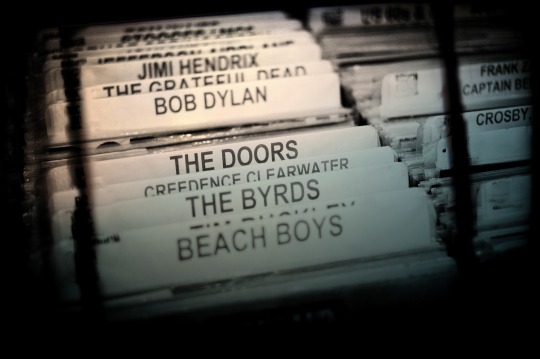
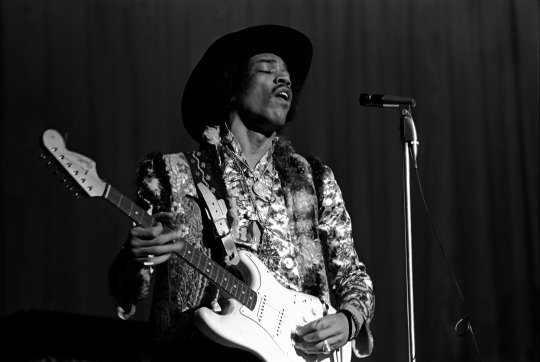

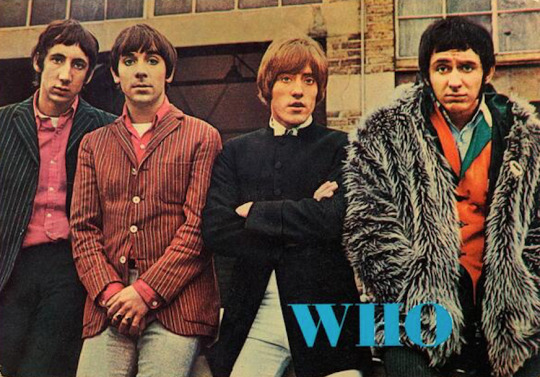
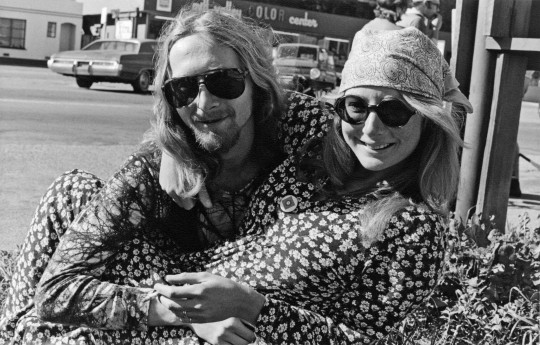
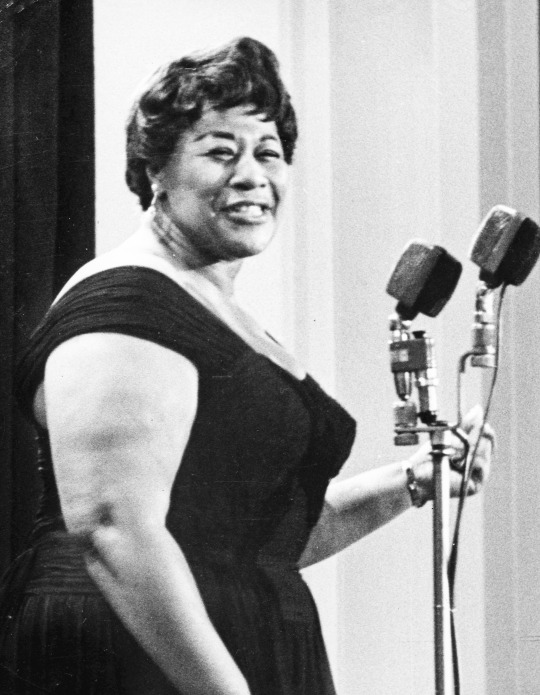

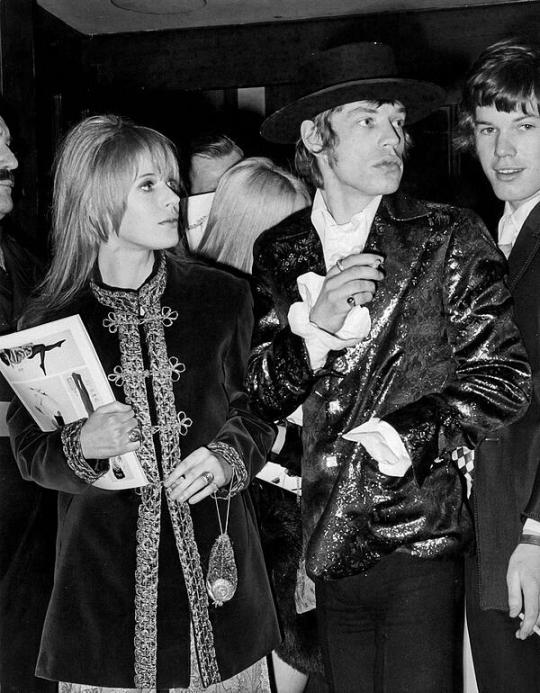


‘Getting ready to rock - and why we still love a festival, 50 years after Woodstock’.
A potted history of the Music Festival, written for the Superstock Image Library.
Peace and Love, man. And believe it or not, Mozart.
In 18th Century England, the cathedrals would fill with the festival-goers of the day, keen to hear the sublime music of Mozart, Beethoven and Rossini. These gatherings were some of the first music festivals in existence.
The word ‘festival’ itself was first recorded in the English language in the middle of the 16th century. It derives from the word ‘feast’, celebrating the harvest.
Before that, in ancient Greece, they used to hold The Pythian Games, a festival of culture in which art, dance and music were performed, pre-dating the sporting aspects of the games.
Of course 1969’s Woodstock Festival is probably the most famous festival of all and the one that expanded 1967’s Summer of Love experience to really put festivals on the map.
In Bethel, upstate New York between 15 and 18 August 1969, 500,000 hippies sprawled out watching performances by, amongst others Jimi Hendrix, Janis Joplin, Santana, Creedence Clearwater Revival, The Grateful Dead and The Who.
The myth persists that it was all ‘peace and love’ and spaced out bliss for those that were there. The reality, particularly for the bands was somewhat different. The Who’s singer, Roger Daltrey recalled “We were due on in the evening but by four the next morning we were still hanging around backstage in a muddy field waiting. And waiting some more.”
This really goes against the grain of the legend of Woodstock, especially when Daltrey goes on to say “Three days of peace and love? Do me a favor. It was crazy even before we arrived. Pete (Townshend) spent several hours in the traffic jams. Other artists didn’t make it at all. The whole place was chaos.”
A few months later on Saturday 6 December of the same year a free concert at Altamont Speedway Race Track was held, featuring bands such as Crosby Stills, Nash and Young, Jefferson Airplane and The Rolling Stones. Thrown together and badly organised, The Grateful Dead declined to play in the end because the atmosphere at the festival was turning increasingly ugly as the day wore on.
When The Stones finally went on stage as the headline act, the Hell’s Angels, who had incomprehensibly been drafted in as security were in fact causing most of the trouble. A melee broke out during The Stones’ performance of ‘Under my Thumb’ resulting in the death of 18 year old Meredith Hunter at the hands of one of the Hell’s Angels.
This concert really signified the end of the Sixties, and the idealism of the hippies was stripped away to reveal the ugly side of the counterculture that now existed underneath.
It’s interesting that the perceived carefree legacy of Woodstock, as well as some of its late 60’s fashion has informed the look and feel of subsequent festivals; and still does to this day judging by the flowers in the hair, the face painting and the skimpy fashions at this year’s Glastonbury festival.
Perhaps Woodstock marked the moment that ‘counterculture’ really entered the mainstream and started to become commoditised. It’s no surprise that things have moved on considerably since 1969 and these days there is an explosion of festivals every summer, in the US, the UK and across Europe.
Woodstock wasn’t America’s first festival though. One of the first was the Newport Jazz Festival, that took place in Rhode Island in 1954 in front of 11,000 people, who had flocked to see legends such as Billie Holiday, Oscar Peterson, Ella Fitzgerald and Dizzy Gillespie perform.
And over in the UK, there was The Reading Festival, which is the world's oldest popular music festival still in existence. Starting in 1961 and still going strong today, it has always embraced all genres of new music and therefore stayed relevant to the music fans who attend. Notable bands who have performed there over the decades include Long John Baldry, Georgie Fame, Fleetwood Mac, Deep Purple, Cream, The Jam, The Police, The Cure, Iggy Pop, AC/DC, Blur, Pulp, Guns ‘n’ Roses, Red Hot Chilli Peppers, Eminem, Nirvana… and countless more.
Not long afterwards, in 1967, as the Sixties ‘happened’ in America, its youth embraced the ideas of peace, love, counterculture, and escaping from the rigid conventionalism of their parents’ generation. To prove it they embraced the Monterey International Pop Festival, witnessing the famous moment in Jimi Hendrix’s slot where he sets his guitar on fire. It was also where Janis Joplin really arrived on the music scene as a force to be reckoned with and where The Who launched themselves to conquer the US market. This is where ‘The Summer of Love’ officially started.
Meanwhile in the UK, The Doors, Joni Mitchell, Supertramp, Leonard Cohen, Joan Baez, Chicago, Procol Harum and of course Jimi Hendrix and The Who played to over 600,000 people on a small island off the south coast of England. The year was 1968 and The Isle of White Festival was born.
Some of the biggest bands in the world have played Isle of White since the early 2,000’s including The Rolling Stones, David Bowie, Foo Fighters, Bruce Springsteen, Paul McCartney, Pearl Jam, Kasabian, Amy Winehouse, Kings of Leon, Jay-Z, Muse, The Strokes, Coldplay, The Sex Pistols, Fleetwood Mac, The Police and Blondie.
And of course there’s Glastonbury, possibly biggest current festival in the world. It came into being on 19 September 1970. Sadly, Jimi Hendrix never had the opportunity to perform there, as the day before the inaugural event, he died in his London Apartment.
Founded on the ethos of the hippie counterculture, the Glastonbury festival site still has areas called Green Futures, The Wood and Healing Fields and includes dance, crafts, poetry and spirituality alongside its cutting edge music. Nowadays the festival has hundreds of thousands of fans attending each year and it has become huge business, with the event even offering cash point machines, deluxe tent accommodation and high class catering.
The popularity of music festivals spread throughout the world in the 70’s and massive events started to pop up everywhere, from South America to South Africa. The counterculture vibe that started in the 60’s continued to be felt over next two decades as different subgenres of rock were born – from punk to metal and beyond.
The Burning Man Festival, which takes place annually on the bed of an empty lake in Nevada's Black Rock Desert, was founded in 1986 by San Francisco artist Larry Harvey. His idea was to get a small group of people together on the Summer Solstice and burn an 8-foot wooden effigy of a man.
Burning Man is really an experiment in temporary community – something that extends the original hippie ideal and brings it bang up to date. Its counterculture roots also show themselves with its anti-consumerism stance and interest in self-expression. There is a sense of ‘anything goes’ at Burning Man with activities like performance art, using light or fire, nude body painting and the creation of ‘mutant vehicles’ which to mind the action sequences in the original Mad Max movies.
In neighbouring California, The Coachella Festival launched in the 90s, on the back of a concert by Pearl Jam. Like other music festivals, it includes art installations and sculptures, along with Rock, Pop, Hip Hop and Electronic Dance Music. In 1999, 10,000 people came to see Beck, Jurassic 5 and Rage Against the Machine perform. Today the festival has around 75,000 visitors and has featured some landmark moments like Daft Punk’s revolutionary LED-lit pyramid and Tupac’s posthumous performance via hologram.
We should also mention ‘Acid House’ music and the rave culture that spread first across the UK in the late 80’s and then across Europe and back to the US, on the back of the ‘House Music’ scene that came out of Chicago a couple of years earlier. Epitomised by the yellow smiley face graphic, House music encouraged both community and freedom of expression through dance. Alongside the clubbing, blissed-out groups of ravers, fuelled by the drug of the day, Ecstasy began to meet inside large warehouses and at massive outdoor events in fields, to dance through the night, in what became known as The Second Summer of Love.
Today’s music festivals are almost like mini corporations encompassing everything from retail to tourism and fine dining. But they allow us experiences. A study by ticketing agency Eventbrite revealed that Millennials value experience over ownership: 78% would rather pay for an experience than for material goods, compared with 59% of boomers (born 1946–1964).
Festivals may have lost some of their counterculture credentials - but they are still incredibly popular events in the social calendar and as human beings, we all embrace the idea of community and coming together and experiencing things collectively. Particularly when it’s accompanied by great live music.
#woodstock#festival#rocknroll#livemusic#the who#jimi hendrix#the rolling stones#photography#rock photography#ashleyjouhar
13 notes
·
View notes
Note
gen y =millenials so there is only one generation bw them. typically the parents of millennials of baby boomers.
My bad on the first, I forget it a lot since when I took the college class about this, we never used the term millenial. Still, on the second:

And on top of that:

So while baby boomers officially end in 1954, the beginning date for Gen X is around 1961. Those in that overlap would be in their late fifties (56-54, +/- 1), but most the time we’re talking boomers we’re talking people in their 60s or 70s. Considering my own age (22), the general age of those on Tumblr (which is a couple years younger than me, at ~17/18), and that both of my parents are Gen Xers (the older is 52 - he was born 1967) and not boomers - and the only person I know whose parents are actually boomers are in their 60s and didn’t have their first kid until they were ~36. Something I know is outside of the norm for most parents.
6 notes
·
View notes
Text
RAY FERRELL
August 24, 1949
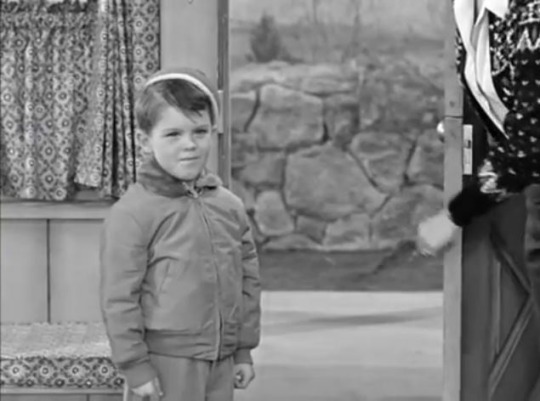
Ray Ferrell was born on August 24, 1949, in Los Angeles, California, as Raymond Delmer Ferrell. He was best known for playing Bruce Ramsey on three episodes of “I Love Lucy.” He was the younger brother of Todd Ferrell who played Boomer Bates on "Lassie". Ray also appeared on “Lassie” but not in the same season as his brother. They did, however, play brothers on three television programs, one directed by “Lucy” director James V. Kern, who likely was influential with Ray’s casting on “I Love Lucy.”
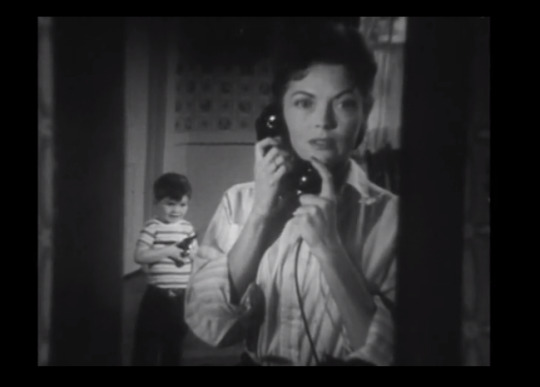
He made his screen debut at age 5 in the CBS anthology series “Four Star Playhouse.”
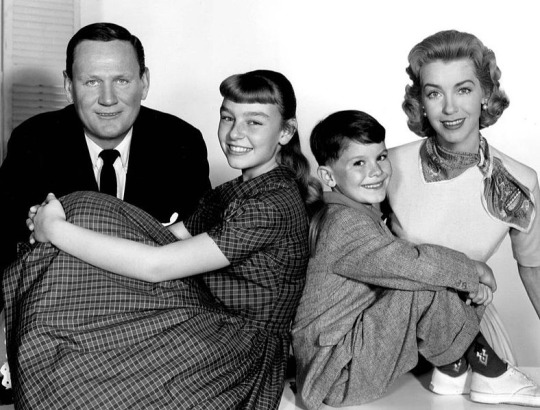
He was also known for 14 episodes of the TV series “Peck's Bad Girl” (1959). “Peck’s” also featured “Lucy” cast members Doris Singleton, Lawrence Dobkin, and Bart Braverman.
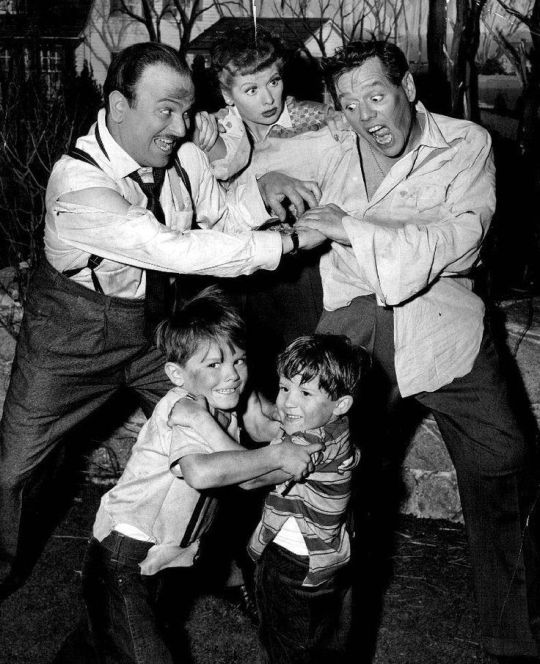
His first appearance on “I Love Lucy” was titled “Lucy Gets Chummy With The Neighbors” (ILL S6;E18) on February 18, 1957.
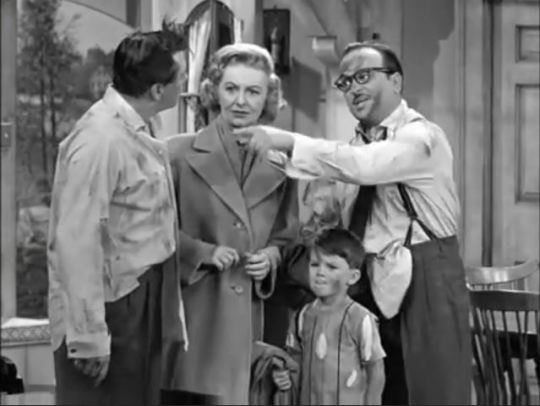
Ferrell played Bruce Ramsey, the son of the Ricardo’s neighbors Ralph and Betty Ramsey (played by Frank Nelson and Mary Jane Croft).

Bruce was Little Ricky’s best friend.
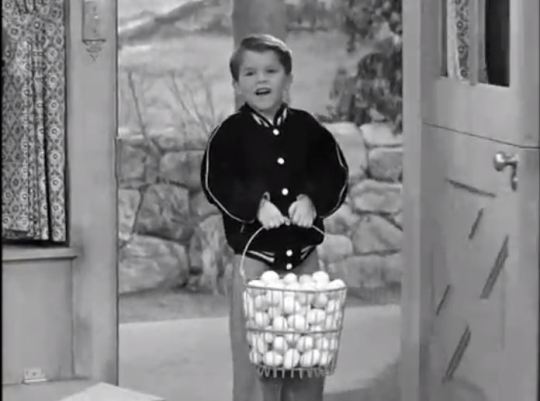
His second appearance was in “Lucy Does the Tango” (ILL S6;E20) on March 11, 1957. The episode was notable for the longest laugh on the series. Eggs were integral to that laugh and to Bruce’s appearance. This is the only time Bruce appears, but his parents do not!
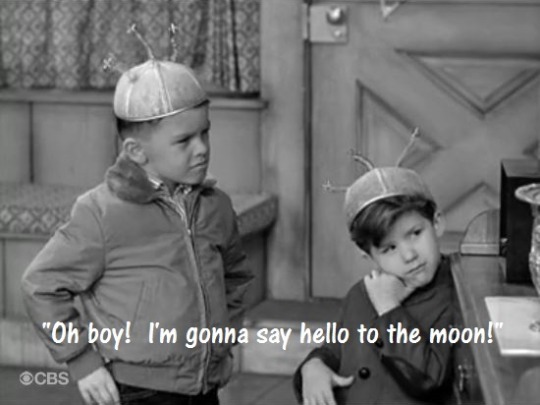
In “Housewarming” (ILL S6;E23) on April 1, 1957, Ferrell’s third and final series appearance, the Ricardos and Mertzes install an intercom, which the boys believe can help them talk to outer space!
“That isn’t the moon, that’s my mommy!” ~ Bruce Ramsey
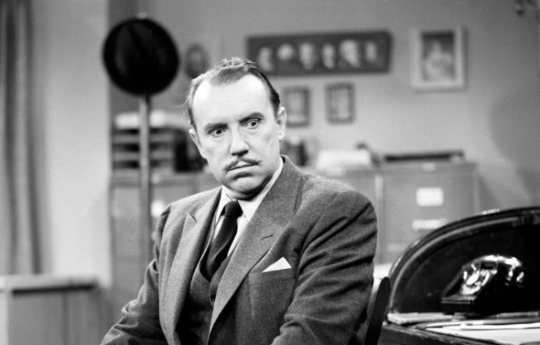
Also in 1957, Ferrell appeared in an episode of “The Box Brothers,” a short-lived CBS sitcom starring Gale Gordon.
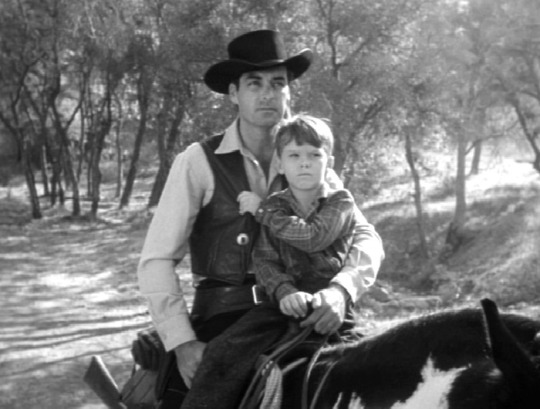
After “I Love Lucy” Ferrell did a 1958 episode of Desilu’s Western series “The Texan” starring Rory Calhoun...
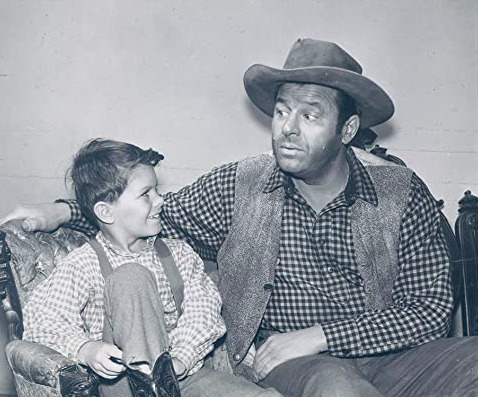
...and two episodes of “Zane Grey Theater” in 1958 and 1960 starring Jack Carson.
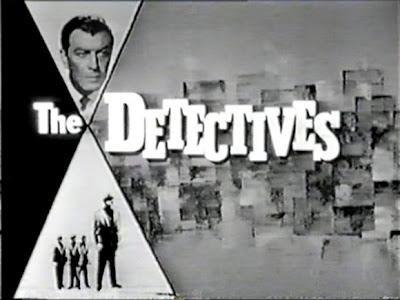
Ray Ferrell left show business in 1961 with his final appearance (age 12) on “The Detectives” starring Robert Taylor.
He died on August 25, 2006 in Athens, Tennessee, one day after his 57th birthday.
#Ray Ferrell#I Love Lucy#Lucille Ball#Desi Arnaz#Richard Keith#Keith Thibodeaux#Zane Grey Theater#The Detectives#Mary Jane Croft#Frank Nelson#Rory Calhoun#Gale Gordon#Lassie#Todd Ferrell#Four Star Playhouse#Peck's Bad Girl#TV#CBS#Lucy
0 notes
Photo
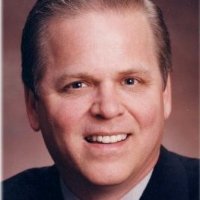
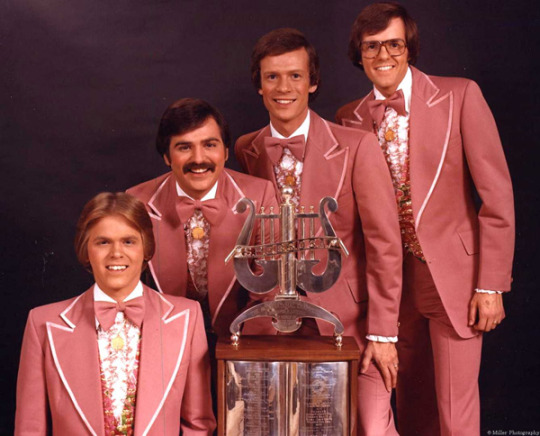
Ken Hatton shares his insight about performing with the Bluegrass Student Union, the Louisville Thoroughbreds, his experience as a director, solo performer, and arranger, and his very candid opinions about the evolution of the music industry and the Barbershop Harmony Society.
Top photo: Ken Hatton
Bottom photo: Bluegrass Student Union 1978 International Quartet Champion of the SPEBSQSA (DBA Barbershop Harmony Society) (L to R) Ken Hatton, Allen Hatton, Dan Burgess, Rick Staab
Todd Wilson had a chance to interview Ken Hatton for our email newsletter. Todd is one of our founders and serves the Nashville Singers as Executive Director and Artistic Director.
You can subscribe to our newsletter by texting the word SINGERS to 42828
DISCLAIMER: Some of our readers may find Ken’s responses to a few of Todd’s questions a bit edgy. Due to the length of this interview, only a small portion was published in the Nashville Singers newsletter. Hatton’s views do not necessarily reflect the views of the Nashville Singers organization.
TW: When did you know you wanted to be a singer?
KH: It’s impossible to remember not being a singer. Granddaddy and Dad were both “song-leaders” in the Church of Christ (“Minister of Music” was considered too “uppity”), and Dad joined the Louisville #1 Chapter of SPEBSQSA, Inc. as a tenor with his high school gospel quartet, in 1951. Mom was a fair pianist and could hold a tune pretty well too. Brother Allen was born in 1954, and I came along in 1955.
The Church of Christ held that instrumental accompaniment was a sin when making a “joyful noise,” so all the worshippers sang in 4-part harmony, you know, just like that original quartet, “Matthew-Mark-Luke-and-John.” It was all we knew as toddlers, so I can’t really recall when I learned to sing harmony. It just always was. Dad taught us to use our “musical ear” to find the harmony, using the shape-notes in the hymnal. His advice was, “When the note moves up, sing higher, and when the note moves down, sing lower, until it sounds good with the melody-note.” That was how we learned to woodshed; it was a spiritual thing.
I do remember at the age of five, when I learned my first popular song. Allen was in the first grade, and I would wait for his school bus every day on the front steps. I really missed my playmate! Each afternoon, he would teach me all the things he had learned that day in school. On one of those afternoons, he sang me a song that some of his fellow first graders had heard on the radio. Within a few minutes, we were singing it in unison, and with some occasional improvised harmony. “When I was a little bitty baby, my mama would rock me in my cradle, in them ol’ cotton fields back home.” I’m not sure that’s when I knew I wanted to be a singer, but that’s when I realized that I was one.
TW: What can you tell us about growing up in the Hatton family?
KH: We were encouraged to participate in music-programs in school by our parents, and we enjoyed those activities. Perhaps talent at a given discipline affects one’s motivation (For some reason, I did not really dig long division or algebra). Allen learned to play the trumpet, and both of us took piano-lessons as youngsters. Later, our younger sisters displayed similar talents for singing, and the oldest of the three, Jo Anne, played piano. Dad was one of the original Thoroughbreds, when the chorus was formed out of the old Louisville Chapter, and Mom sang with the Kentuckiana Chapter of Sweet Adelines, Inc. (later, Sweet Adelines International). Both parents dabbled in quartet-singing from time to time, and their ensembles always sounded musical, but never seemed to stay together long enough to earn rank in competition.
Dad took Allen and me to an occasional chorus show, where we would be seated in the audience and admonished not to move. Then, we would watch the chorus rehearse for their performance, and would enjoy the show. I can recall getting an unexplainable lump in my throat whenever that chorus of men would sing with reckless abandon. The highlights of those shows were the several chapter-quartets, including the Derbytowners and (later) the Citations, both of whom were really good competing quartets. We didn’t realize that the goose-bumps and throat-lumps were being caused by the ringing of chords. The big thrill for us, as kids, was to experience the Club House Four. They were a pretty good singing District Champ quartet, but those guys really worked at entertaining. Their jokes and routines were not as “edgy” as the Brian Lynches of the world might prefer, but old folks and kids alike just couldn’t stop laughing whenever the “Club House” was on stage.
The Thoroughbreds’ Musical Director was a guy named Bill Benner, who had moved to Louisville for work, after having directed the Lake Washington Skippers to a second place finish in international competition in 1957. Over a four year period, he took the brand new Thoroughbred Chorus to 8th, 6th, 2nd and 1st place finishes, winning their first chorus championship in 1962. Soon after that competition, Bill resigned as director, though he still conducted the Sweet Ads for a while. It seems he had been so focused on barbershop that he had ignored his wife and his job, and they both sort of fired him. He needed to get paid for directing the chorus, and the 1962 T-breds didn’t like that very much. So, our family took him, in, and Dad provided him with a job at his real estate company.
The saddest part was that Bill was being considered for the Society’s Music Services Director position. The Thoroughbreds’ 42 singers had finished second in 1961 to the 160 voice Chorus of the Chesapeake, under the direction of Bob Johnson. It was revealed later that year that a certain judge was a member of the winning chorus, and he had over-scored the winners and underscored the ‘Breds. The judge was kicked out of the judging program, and the Thoroughbreds received a secret apology, which was delivered in person by the new Music Services Director – Bob Johnson! It probably was a good thing, as Bill’s tunnel vision personality might not have been a good match for that position.
Bill proved not to be much of an agent, but he sure was fun to have around the house! While he was thinking about what he was going to do with the rest of his life, and eating Mom’s home-cooked meals every night, Bill would teach us tags. The guy was a savant, carrying all four parts in his head, and could teach the whole song by rote – eight bars at a time, with no “spots (That’s what we called sheet music back then).” In fact, that’s the way Bill had had taught most of the charts to the Thoroughbreds for four years – by rote.
So, Allen and I had one of the Society’s premiere musical smart-guys in the bedroom next to ours, and we got quite an education during his year and a half long visit. It turned out that we were pretty quick studies, which was a good match for a bipolar type, like Bill. There were five us in the house at that time who could hold our parts, and it was fairly easy to sing one of Bill’s tags after very little teaching time. The first one we learned was “I Found in My Mother’s Eyes.”
Bill moved to Chicago, and none of us ever heard from him again. Jim Miller and Joe Wise had been appointed co-directors, and with the help of coach/arranger Ed Gentry, ushered in a new era of barbershop chorus singing through the Thoroughbreds. Meanwhile, Mom took Bill’s place as Musical Director of the Kentuckiana Chapter of Sweet Adelines, Inc., later directing Falls of the Ohio Chapter, Derby City Chorus and Song of Atlanta. She served as a judge in SAI contests, and sang a pretty mean baritone.
Most choruses had a rule back then that excluded men under the age of 16. The exception was that one could join at 15, if your dad was an active member. The thinking was that the members looked forward to their night out with the men (not with the women or the children). They didn’t watch their language, and if they felt like having a beer or a smoke, they didn’t have to worry about being a role-model for just that one night each week. Boy, I miss those days!
Allen and I both joined at 15, and sang in our first Chorus Contest in Atlanta, in 1972, in which the chorus placed third. We were disappointed, as the Thoroughbreds had won the championship without our help in 1962, 1966 and 1969, and were tied with Pekin, IL for the most international wins. Allen headed off to Morehead State, and back home, Rick Staab, Danny Burgess and I got our feet wet, singing with an “old” Thoroughbred named Paul Morris on tenor. Paul was 28. We sang together for about six months. Rick went away to attend Georgetown University, breaking up the group, and Allen came home to attend University of Louisville. Then, Rick surprised everybody, and came home to attend U of L as well. That’s when the final combination of the Bluegrass Student Union was formed, with Allen on tenor. Now, we had four guys about the same age, with similar skills and education.
Mom (Mary Jo Hatton) was our first coach, and refused to let us work on craft, focusing instead on singing with the right muscles. She knew we wouldn’t go back and do that grunt-work after we had earned the “cheap” points. Mom was concerned about us damaging our young voices, so she demanded that we master vocal production first – a smart move.
TW: What got you interested in barbershop harmony?
KH: One could say, “See Question #2,” and just stop there, but there is a twist. As a young teenager during the hippie-years, barbershop was associated with the establishment, and we young people had our own subculture. We were told not to trust anyone over 30, and pop music was progressing in a different direction from Tin Pan Alley and the Great American Songbook. I perceived barbershop in those days as a fun hobby for older fellows, but the quartets and choruses I had heard didn’t seem like a good fit for the musical trends I was following as a baby-boomer.
Allen and I attended our first International Convention on our parents’ coattails in 1964. Later, we attended our second one in 1968 (I was twelve), and discovered that barbershoppers had lots of pretty daughters in the “Barberteens” room, but didn’t appear to have very many sons. That turned out to be handy for us. We enjoyed attending those conventions, and sang some tags, but didn’t really pay much attention to the musical goings-on – too many distractions.
Fortunately, Mom and Dad had a library of recordings of the Society’s Top Ten quartets, as well as recordings of live shows and Long Play (LP) record-albums produced by top quartets like the Renegades, Roaring Twenties, Boston Common, Dealers Choice, Regents, Gentlemen’s Agreement, Sundowners, Sidewinders, etc.. We listened to them all, and enjoyed some more than once. But far and away, the quartet whose records I fell in love with were produced by the Sun Tones (later the “Suntones”). My headphones and I spent hundreds of hours poring over their fantastic renditions of popular songs set to barbershop, and that music convinced me that this particular a cappella style could actually be “cool.” Later, I would wait by the mailbox for each new Suntones-record, as it was released. I listened until I had accidentally memorized all four parts to all of the several “Sunspots” records that we had. That was the final piece of the puzzle. I then joined the chorus, because I simply had to.
TW: You were a member of the Thoroughbreds, considered one of the most successful barbershop choruses in history. Can you share a few of your own experiences with the T-breds?
KH: Like you guys, I could write a book. Most of my experiences would be similar to those of other long time barbershoppers, and if I started telling about funny things that happened, we would never be able to list them all. I will mention one general happening that helped create my personal mission and philosophy.
Our 120 man chorus showed its best face during competitions, but after winning each trophy, about half of the guys would take a “break” for a couple of years. We would be left with 60-70 active singers, who did the business of the chorus, week in and week out. That core of “lifers” sold the tickets and program-ads, built the scenery, commissioned and tweaked the arrangements, rehearsed the show-tunes and performed the package-shows. The rest of the guys came back only to compete.
To our director, Jim Miller, it didn’t matter how small the audience was, or whether it was a prestigious event. He spent the same energy in preparation and performance, whether we were singing for a banquet of 75 people or a stadium of 10,000. I can recall many tough shows for small audiences who were not expecting the entertainment to be some barbershop group. Jim would plan the show carefully, knowing that we would have to work hard and smart, in order to please the “tough” crowd. Then, he would rehearse us for a couple of hours before the performance, to see which key people were missing, and would change his plan accordingly, moving certain singers to different voice parts to achieve balance, and substituting some second string MCs, soloists and quartet-singers.
After a complete run-through, the chorus would hit the stage, and Jim would let the audience know with his body language and apparent effort that we wanted to please them. He would work up a sweat, and motivate us to dig in, so as to deliver the most emotional and exciting performance we could muster. We always exceeded the expectations of those tougher (smaller) audiences, and each performance made the event seem more important to them and to us than it really was.
BSU followed Jim’s example in that regard, and, with few exceptions, we exceeded the expectations too. For three decades, our quartet did a complete run-through before every performance. We found that our percentage of remembered lyrics and accurate intervals went up, while our number of seconds of dead time went down.
Music Educators generally teach singers to perform without showing any apparent effort, but that was exactly the opposite of our approach. We always wanted the audience to sense how hard we were working for them, so we made sure that all of our effort was apparent. That made our audiences feel special, which is supposed to be “the job,” isn’t it? Jim’s and our approach was one of the things that set our chorus and quartet apart from most others, who tried to hide their effort during performances, for some unknown “sophisticated” reason.
One exception? We sang for a United Nations General Assembly dinner at the Waldorf Astoria in the early 1980s, and we gave ‘em our best stuff, performing with reckless abandon. We never got more than a white gloved golf-clap from those diplomats. Our host explained that they had all been taught to be very reserved, when in the presence of each other. But our job was to make them forget their emotional training, so we failed that day. There were no whistles, shouting, hats in the air, money or room-keys on the stage, and no tears or laughter from anybody. It was miserable. Later, at the reception, the audience-members were quick with the compliments flattery, but I just wanted to crawl under a rock.
The rest of the 33 years of shows pretty much run together in my mind, because they were the same in this regard: We gave everything we had in preparation and performance, and fell across the goal line each time, totally spent and exhausted… victorious! Looking back, our experience was a lot more fulfilling than if we had taken some drugs, skipped across the stage, and tried to hide our efforts from the crowd. Thanks, Jim!
TW: What were the names of some of the quartets and quartet-singers you sang with before the Bluegrass Student Union? Compared to those quartets, what was different about the BSU?
KH: BSU was the first organized quartet of which I was a member. Years later, I sang in several other quartets; Kids at Heart, The Sensations, The Exchange, Four for the Price, Bold Venture and The Daddy-Ohs! One difference with BSU was trust. Since I knew that the other parts would always be where they were supposed to be, I was free to think about the message of the song and our emotional connection with the audience, instead of being preoccupied with a few synchronization errors, out of tune chords or horizontal tuning (song going sharp). The other main difference was the fact that BSU was all business. When the last man arrived at rehearsal or at the studio, we started singing, and we didn’t quit until the first guy had to leave. On the road, we didn’t sight-see or attend a lot of parties. We discussed future plans on the plane or in the car, had our carb-dinner together, rehearsed at the hotel, went to the venue early, set up our recordings in the lobby, dressed and made up, did our complete run-through, and gave our performance. Then, we repeated the process before the afterglow. We often listened to the show tape on the way home, and discussed improvements for the next show. Every action was designed to maximize the quality of performance. In some of those other quartets, we spent a little time more enjoying ourselves, and that was fun, too, but in a different way.
TW: What can you tell us about a few of your most memorable BSU performances?
KH: There was a sameness about our performances over the years that makes them all kind of a blur. The common denominator was the audience-reaction. We started with a short, fast, high pitched opener, designed to get the audience’s attention away from whatever had preceded us on the show. We followed with self-deprecating humor, to make them like us personally. Then, we sang a swing-tune to charm, and followed with a sincere love-ballad, for the “kill.” After that, we could sing our novelty songs, to demonstrate virtuosity, and repeat the process ad infinitum. We were never really a one-song standing ovation kind of quartet. Our approach was a selling process, designed to earn the audience’s respect and love over the course of the performance. Typically, the long or standing ovation would come at the end, as designed, and only then would we agree to perform an encore. Incidentally, you never saw BSU take cups or bottles of water on the stage. What’s up with that? Do beta-blockers dry you out?
Of course, we saw our share of far-away places and prestigious venues, but prestige and exoticness were not what made a performance memorable. Again, it was the audience. One that stands out was in Viborg, South Dakota. This community had one hotel, made of unpainted concrete blocks. There was no phone in the room, and a black and white TV was advertised at 50 cents extra per day. The venue was a high school gymnasium, and our expectations were low. Nevertheless, we prepared according to our training, and when we hit the stage, we realized there was standing room only in the place; people were hanging from the light fixtures to get a chance to see this show. We didn’t know that South Dakotans rarely got to see any kind of live entertainment. People had driven to Viborg from several hundred miles around. It was such an appreciative crowd, and we were able to deliver a solid performance because we had not taken them for granted. Carnegie Hall was nice, but this crowd was deafening!
We were invited to sing on the Saturday evening show at the Buckeye Invitational, in Columbus, Ohio, 30 years after our first performance. It was to be our second appearance at the Buckeye, which was rare, so we were excited about the opportunity, late in our long career.
We decided to dress and make up in our hotel rooms, and arrived during intermission, knowing that there would be a feature quartet before our spot as the headliner, which was traditionally the final act. The stage manager excitedly welcomed us into a dressing room, expressing surprise that we were so late, and advising that we were scheduled to open the second half of the show. I apologized, and asked, “Who is headlining?” “Max Q,” he replied (who at that time was a silver medalist).
Barbershop-etiquette calls for the International Champion to headline the show, which should have been us. It was (and is) a slap in the face for any champion to play second fiddle to a second place quartet. Of course, it was possible that the show producers were neophyte barbershoppers who didn’t know any better. However, there is no way that Max Q would not have known that tradition. They should have declined immediately, when asked to headline, but evidently, they had decided it was appropriate for them to be the stars of the show, for some reason that was more important than good manners.
We decided that the only thing to do was to remain quiet about their offense, and to simply do our “talking” with our performance, as we had been trained to do. We spent a few minutes in the dressing room, rearranged our song-order and palaver for maximum effect, and went through the curtain with big ol’ grins, about half pissed off. We opened with “Back in Business,” and the crowd went wild. We just banged every song, and there was nothing left for Max Q, but a pile of juice. In the lobby after the show, our recording table was mobbed, and theirs had four lonely guys in tuxedos holding pens, with a couple of crickets chirping, and no autographs to sign. Second again!
As we were packing up, Jeff Oxley ambled over, and said sheepishly, “I guess you guys probably should have headlined this show.” Ya think? Yeah, that one was memorable. We never told anybody about it, until this writing.
In the 80s, we did some research by surveying the various chapters. There were over 800, and about 600 of them held an annual show, with a guest quartet. If you took out the holiday weekends, on a given Saturday night, there were 15 annual chapter-shows going on in the country. All of the show-chairmen wanted a champion, a past-champion or a top ten quartet as their headliner. As one of the most popular show-quartets, we had our choice, so we conducted a survey, and began to be selective about which bids we would accept. Our goal was to maximize fun and profit. We started to perform only where the chapter had a larger crowd (good for recording sales) and a reputation of hospitality where other guest quartets were concerned (good for the fun).
We pitched in with the Citations, the Harrington Brothers and eventually the Suntones, to organize three special weekends. We approached chapters about sponsoring special shows that would feature BSU and each one of those other quartets, with only quartet-singing – no choruses. The idea went viral, and the three weekends were spectacular - so much fun! The last one was in 1991, with the Suntones. We performed on a Friday night, two shows on Saturday and one on Sunday afternoon in the southern Michigan and northern Ohio areas. What a kick to ride around for the weekend with our idols, and get to know them personally! We included a set as an octet, since we knew all of their tunes, and we traded two of our guys for two of their guys at the afterglows. It was a dream come true, and BONUS – we all became good friends.
TW: What BSU CD recording project generated the biggest sense of pride, and what about that project was different?
KH: We were proud of all of our recordings, because we took great care in the production of each one. From a young age, we knew that our quartet was finite, and hoped that people would listen to our recordings, long after we were gone. That thought was on our minds with the planning and execution of each project. Bobby Ernspiker was our recording engineer, and he was also the son of a Thoroughbred.
On the first two albums, “After Class” and “The Older the Better,” we had a largely technical approach, caring more about the accuracy of the notes, the ringing of the chords and the intelligibility of the lyrics than about the art. We were making pretty good bucks on the road, so we decided to give Bob unlimited control over the duration of sessions. Bob was our fifth set of ears, and was instrumental in capturing the best performances we could muster. Unlike other quartets, we spent six months to a year in weekly recording sessions, to do our best work. It was our perception that those albums were not perfect, but they were better than most others. We made money, although our sales were not yet commensurate with the expense and effort we had invested.
Having met Walter Latzko, we decided to do our first theme album, which would be the first one created by any barbershop quartet. We chose Meredith Willson’s “The Music Man” as the theme, and set to work on Walter’s fantastic arrangements. We spent more time listening to Bobby’s guidance in the studio about emotional performance. It took a year to take the tunes from the paper to the stage, and another year to record them. This time, we spared no expense on the studio time, the costuming, choreography, graphic art and photography, in an attempt to create the best show-package and recording in the history of the Society. The result was an artistic success, but again, the sales were no better than those of any ol’ past champion.
In spite of the apparent unwillingness of the buying public to notice any difference, we were pleased with the product, and decided to look for another theme. We eventually settled on the songs of the 40s, and the idea for our “Jukebox Saturday Night” album was born. Latzko and Waesche, our two faves, collaborated on the charts, and we applied the same attention to detail (and spent the same moneys), to create the best product possible. We accelerated our attention to capturing the right mood for each song. When that recording hit the streets, the sales went through the roof. It was puzzling; perhaps the barbershoppers were tired of the Music Man theme, but excited about hearing tunes adapted to barbershop that they had not heard before. For whatever reason, this particular theme appealed to them, and Jukebox catapulted us to a new level of acclaim that left the other past champs behind. The perception was that we were progressing, improving and pushing the edge of the envelope musically, just as our great examples, the Suntones and the Buffalo Bills, had done twenty and thirty years before.
We continued that approach with a collection of tunes written by George Gershwin, whose chords and progressions had earned his songs taboo-status in previous Society competitions. But we liked them, and so did Walter (Latzko) and Ed (Waesche). The result was our album, “Here to Stay,” the first one we did not release as an LP record, but only as a CD and a cassette. The songs were more sophisticated, the arrangements were arguably better, and the performances were emotional. The singing demonstrated greater savvy, while our technical execution was just a hair less precise than that of the previous two recordings. The perception was that this was a lateral move, kind of an extension of Jukebox, and the sales were just as strong as those of the previous album.
In 1998, we introduced “LEGACY,” a 25 year collection of audio recordings in a 3-CD box set, including all five studio-albums, several previously unreleased tracks and a recording of a live show, complete with declamatory stuff between songs. In 2006, we created our final recording product, called “COMMENCEMENT,” a 2-disc set (1 CD and 1 DVD). The audio disc includes a few tracks that we were messing around with when we decided to retire for good. The video disc includes the best performance of each song that we could find on video tapes we had collected over the years.
Fans of “Here to Stay” and “Jukebox” have since gone back and checked out “Music Man,” and found it to have been under appreciated by past generations. We understand that our video of the Music Man show-package has been used by teachers at Harmony University for decades, to demonstrate showmanship, the way to put a show together, avoidance of dead time and the use of costumes, props, lighting, effective pauses and voice-over-music, to enhance a quartet’s performance. That pleases us very much. All of our tracks are available perpetually and digitally through iTunes, CDbaby.com and Pandora. We have discontinued production of all hard copy CDs, etc.
We are certainly proud of all of the products, since those five (original) releases each represented our best work at a certain stage in our development. By design, many of the songs in the second half our career had a timeless appeal that continues to pay dividends. Thanks to some good taste in song selection, great arrangers, hard work, outside-the-box engineering and professional artwork, our collections of recordings are still being purchased and listened to today. We anticipate that people will enjoy our music a century or two after we start keeping each other company at the ol’ marble orchard.
TW: The Nashville Singers had a chance to sing your arrangement of “Manly Men” a few years ago, and the audience loved it! When did you complete your first vocal arrangement? Do you remember the name of the song?
KH: Glad you liked that one, but sorry, I really don’t remember the first one. When BSU started, I was not adequately educated to sight-read. That skill was developed slowly, and by necessity, over the years. BSU was a hybrid quartet – that is to say, we were products of the woodshedding generations of the 40s, 50s and 60s, but were also affected by the work of genius-arrangers of the 70s and 80s. As a result, we did not trust some aspects of the written arrangement, and always reserved the right to woodshed our own changes. Sometimes, they were necessary, to facilitate breath-points and “covers” of pickups. Other times, they were swipes that we heard and felt, as we learned the chart. Helping to create the tune was a big part of the fun that we simply refused to give up.
Most arrangers think it is presumptuous of others to change anything about their work. That attitude is hypocritical and presumptuous in itself, since an arrangement, by definition, is composed of changes from the songwriter’s original work, who is the real (and legal) artist in question, anyway. As we experienced different arrangers, we figured out which ones had a problem with our changes, and we quietly declined any and all opportunities to sing their charts. Ed Waesche was the first to exhibit an appreciation for what he called our “musical sensibilities,” and endorsed our changes, unless we committed a form-error, which he would help us to correct. Later, Walter Latzko encouraged those same sensibilities, so we had two of the smartest geniuses in our corner, which was more than anybody else had. Those who wanted to dictate every aspect of the way we sang a song could go find their own quartet. This one was ours!
The woodshedding accelerated my learning process, and over the years, I learned to spell some of the chords, identify intervals, tell a major key from a relative minor key, make up simple key-changes, etc. Before long, I could sight-read all four parts, and would know them cold before we had our first rehearsal on a given song.
It wasn’t until 2002 that I bought my first Finale software. Friend Walter, had suffered a stroke several years prior, but was still writing arrangements daily, using his left hand to operate the mouse of a computer. The Finale system would enable me to be of assistance to him.
In his salad days, Walter could write an arrangement with his lead pencil and some blank staff-paper while on an airline flight that lasted a couple of hours. He could see the notes on the page in his head, could hear the tune being sung (also in his head), and he could write it down as fast as you or I could write a letter to Mom. That was his genius, and it explains why only a handful of our Society members were respected arrangers in those days. In no case did it take Walter longer than a few hours to hand write an arrangement of a single song.
However, the stroke had robbed him of the use of his strong writing hand and of some of his energy. On the computer, it then took Walter about twelve hours to write an arrangement. It became a two day job, so he would sometimes tire of the piece before he finished, and would send it to me for ideas from my old “musical sensibilities.” We collaborated on a lot of charts during the last years of his life, and he taught me a lot about arranging.
Lacking formal musical education, I am certainly no match for the geniuses who have that special (in their head) kind of talent. However, with the aid of the Finale program, I found that I was competent to write a chart that included some original ideas. With the computer, I could listen to my work through speakers, instead of “in my head,” and, with effort, could tweak the chart until it met my own standards as a top quartet singer.
It was a labor of love, and I was mentored by a guy whom I loved. I found that, even as my performing ability began to slow down, my strong imagination produced the same endorphin-rush, while writing, that I had enjoyed as a performer. Over the past 14 years, I have compiled a modest library of 60 or 70 charts. However, I was not the only one who discovered that Finale can take the place of those certain genius-skills. There are now more competent arrangers than there used to be, all competing for the attention of the top ten quartets and choruses. Of course, there only ten of them, right? So, my catalogue has been placed with friend Jay Giallombardo and his wife Helen, in the hope that some hot shot quartets might notice them. Some of those charts are listed on Jay’s web site, but I am not writing much these days.
Some favorite arrangements that I wrote include a medley of songs from “Paint Your Wagon,” a millennial song popularized by “Five for Fighting” called “100 Years,” and a five part solo (with barbershop chorus background) called “I’m Gonna Move to the Outskirts of Town.” My favorite collaboration with Walter is a contest-chart of a song written by Mel Tormé and Bob Wells, called “County Fair” for an obscure Disney film called “So Dear to My Heart.” We finished that one shortly before my old friend passed away. All of those tunes have matching learning tracks, which should be available from Jay. You can hear full mixes of several of them on my album, “Walter and Me,” available on iTunes and CDbaby.com. Thanks for the commercial.
TW: From 2004 to 2011, you released four recordings as a soloist. What/who inspired you down that path? How would folks purchase some of those products?
KH: In January of 2002, the phone rang, interrupting a BSU rehearsal on a Sunday evening at Thoroughbred Hall. A tiny voice said, “You don’t know me, but my name is Chilton Price, and I’ve written a song to honor the fallen firefighters from the 911 disaster. We would like for the Thoroughbreds to sing it.”
Usually, such a phone call resulted in an embarrassing experience, because I would have to tell the person that they had written a bad song. This time, such was not the case. Ms. Price faxed me her song, and on Monday, I sent it to Walter, who wrote a chart that same day. That evening, I passed it out to the chorus, and we learned in the same night. Two weeks later, we performed it for a thousand attendees of a convention of the National Association of Retired Military Officers and their bejeweled significant others, at the Grand Ballroom of the Galt House Hotel, in downtown Louisville. The place came apart.
I visited Ms. Price the following Tuesday evening, to present her with a recording of that performance, and to thank her for thinking of us. She said,” Ken, I didn’t tell you who I really was, because I wanted you to judge my song by its own merits. I have several gold records hanging on the wall in my hallway. I wrote ‘You Belong to Me’ and other hits from the 1950s. They stopped recording my music when Elvis came along, because I refused to change my writing style. But I have continued to write new songs that sound just like the Great American Songbook tunes for the last 50 years. No one with talent has ever heard them before. Would you be willing to listen to some?”
Chilton played, and I sang. I felt as if I had won the lottery. The first song made me cry, and each one was better than the last one. This was the start of a beautiful friendship that lasted 400 Tuesday nights over an eight year period, until her death at the age of 96. We catalogued her music, and wrote verses and extra lyrics together. We collaborated on new original songs. And we talked about every aspect of our lives, keeping no secrets. You guys should know by now that when you make music together, it is one of the most intimate things you can do with another person. When writing together, we had to communicate the same feeling to the listener, so we had to compare our feelings and life-experiences, in order to tell the same story. It really was one of the thrills of my life, to become friends with an accomplished songwriter, and Chilton, in particular, was a genuine person, with great wisdom and class. She taught me how to write songs.
Along the way, Chilton expressed her desire to have other artists sample her work. We were already familiar with the freshly budding careers of Michael Bublé and Josh Groban, so she was inspired to hire a pianist and record a demo-CD of original songs, with me doing the singing. We called it “Pure Price.” The project turned out well, but we were advised that new songs presented by a new singer was a tough sell. So, we went back to the studio, and recorded a CD with half original songs and half familiar songs, called “The Best Is Yet to Come.” Then, we were advised that, while piano-vocal was charming, the tunes really deserved more accompaniment. So, we went back a third time, and recorded yet another CD of half familiar and half original songs, but this time with a full 17 piece big band and a dozen string-players. The original band-charts were written by our favorite pianist, Jay Flippin, who also put together the best musicians in Louisville for the project. Man, this was a dream come true! To be the Sinatra-guy, with a studio full of hot players and the actual songwriter, smiling behind the glass. It really was heaven. We got to meet with Michael Feinstein for an afternoon, but so far, none of Chilton’s and my unpublished works have been recorded by anyone famous.
By that time, BSU had slowed down, and in December of 2006, we called it quits for good. Another singer who was working at the studio had a steady gig, fronting a big band on the Cunard cruise-ship “Queen Elizabeth II,” and needed some relief, so he could spend more time with his family. So, he got me set up to take his place on several trips for 35 days at a time over the next two years (2007-2008). That was a real learning experience. I was surprised to learn that those musicians do not rehearse. They don’t need the practice, because they can sight-read it the first time, and make it sound like some guy on the radio. The only question was, could I keep up with them?
We had several thousand passengers on the ship, and several hundred of them came on board strictly for the ballroom dancing in the ship’s famous Queen’s Room, which was designed and furnished in the style of the Titanic, from the original White Star Line. It was a classy joint, full of rich folks from several continents, who were very sensitive to the tempo required for each different kind of dance. We performed two one hour sets each evening, seven days a week, and we were not to repeat a song during any certain cruise, some of which lasted for more than two weeks. I had the opportunity to perform several hundred different songs, and I had a whole four measures to figure out the key, tempo, meter and rhythm of each one, before coming in on time and in tune.
The international montage of musicians was mostly fresh out of college, using their talents to work their way around the world, before settling down with a job and family. These guys were all pretty jaded, and showed it with their playing. Everybody was in business for himself, and not enjoying the room, the crowd or even each other. It became apparent that they had been taught by their university professors to look down their noses at the listeners and at other musicians who could not play as well. We had a trombone player who was a great sight-reader, but who was not an experienced improviser. They would “throw him the ball,” and then laugh hysterically (in full view of the audience) at his feeble attempts to play a trombone-solo.
I dressed them down pretty good during the next break. I let them know that this was unprofessional behavior, and I expected them to get a haircut, be sober, stop showing up with spotted ties and wrinkled clothes, and to act like pros, instead of amateurs. They could set me off the boat in Tahiti, and I could fly home – no problem, and they could explain the absence of the singer for the rest of the month. Then, I began to recognize horn players from the stage whenever one would distinguish himself with a solo. I gave them nicknames, like “Mr. Incredible (Ukrainian)” and “Lady-Killer (Canadian).” Before long, those guys were smiling at each other, calling out the measure-numbers and enjoying playing as an ensemble. We didn’t feature the trombone player anymore.
It was a little nerve-wracking at the start, but after three or four days, I was comfortable enough to look up from the music-stand and perform. After another few days, the music-director in charge of all the acts asked me to handle the speaking between songs. At the end of our first 17 day cruise, the passenger-evaluations gave us a score of 85 out of 100, which turned out to be the highest score ever awarded to that particular room. The musicians and the bosses were pretty doggone happy, and the band-director got a raise. All that resulted from a barbershopper – an amateur with a professional attitude – being thrown in with a bunch of professional musicians with bush-league attitudes. I found out from the band-cats that singing in tune on that ship made me an anomaly, which helped.
We made some good noise, and I learned a lot. The favorite tunes we played turned out to be a samba called Quando Quando Quando, with lyrics by Pat Boone, and a waltz-rendition of “If You Were the Only Girl in the World.” The young cats had never heard of the latter, but played it well, and told me, “Dude, you sang that tune like you wrote it!” It was fun! I was able to stick and jab – to back phrase – whenever I felt like it; much different from singing homophony with a quartet. No rehearsal was necessary.
After each performance, we had a midnight buffet, and then I would stay up all night in my cabin, writing band-charts. What was cool about that? The band would play the chart the next night, and would then give me pointers about my writing. It was a great experience, but after two years, I had enjoyed a lot of songs, and had learned everything the ship could teach me. I came home, and fronted for the Don Krekel Orchestra, a big band in Louisville, for a couple years, before retiring from solo-singing. It was a kick, but in the music biz, “you is either famous, or you is pore!” My last gig was a party for some rich folks at the Galt House on New Year’s Eve of 2015. I looked marvelous, but filled the room with mediocrity. Time to move on.
By that time, I had collaborated with Walter on some great charts, and I had written some myself that I liked, so I produced an a cappella recording, singing all four parts. I called it “Walter and Me, and it appears with my three solo recordings on iTunes and CDbaby.com, under the artist-name Kenny Ray Hatton.
TW: Can you talk about some of the choruses you have had a chance to lead over the years? What advice could you give to aspiring choral-directors?
KH: It was always a dream to someday be front-line director of the Thoroughbreds. At the same time, I had watched as the guys who followed John Wooden at UCLA and Adolph Rupp at University of Kentucky do well, but fail to come close to the records of the great ones. I did not relish the thought of following Jim Miller with the ‘Breds.
Brother Allen got his shot when Jim resigned in 1985, as co-director with Ken Buckner. Then, when Bunk left town to work for the Society in Kenosha, Allen was the man! He did well, and if you listen to the recordings, the chorus did some of its best singing ever, under his direction. But certain other choruses were getting better exponentially, and even though the T-Breds tied for first in 1990, the proverbial “coin-toss” went to Dr. Greg Lyne and his Masters of Harmony. Egos, trends and politics divided our chapter after that. Choruses have a way of assigning all the credit for a chorus’s success and all the blame for its failures to the director, neither of which is true. But directors and chorus-members know that going in, so I suppose it’s fair.
When Allen resigned in December of 1992, I was not active in the chorus, but the BOD sent guys to talk to me. I had recently started my own business, and was not prepared to discuss the matter until August of 1993. They had appointed a guy as “interim director,” while they conducted a “search.” The Board asked me to keep quiet about their approach, so they could make that guy think he was getting the job permanently, while they waited six months for me. I refused to make that promise, but I did not go out of my way to let him know. I regret that.
That’s the thing about chorus-directing that I detested – the politics. The official BOD of our beloved Thoroughbreds deceived that poor fellow, an action which was, in their minds, “in the best interests of the chapter.” I never understood how lying to a guy could ever be in the best interest of any chapter. But that’s what you get, when you put humans in charge.
A seasoned judge once wrote, “You get good marks, and win a scholarship. You finish pre-law, and get into a great law-school, where you graduate with honors, and land a job as a clerk for a Federal judge. You get on with a prestigious firm, and after several years, they make you a partner. Then, you run for circuit-judge, and win the election. Your first trial is almost over, and who makes the decision? Two retired guys, three housewives, a file clerk, a bricklayer, a schoolteacher and ditch-digger!” That’s kind of the way a barbershop chorus works. The Board of Directors searches to find the most skilled and knowledgeable person they can to be the Music Director. Then, knowing they are less qualified, they complicate your efforts with frequent attempts to micromanage. Unless you can earn enough implied authority with the troops, it is a built-in recipe for failure.
Regardless, I showed up to accept the directorate in August, and we went to the Cardinal District prelims a few weeks later. We won handily, with a group of about 70 men, and began to prepare for our annual Christmas Show, as well as the 1994 International Chorus Contest in Pittsburgh, with 92 guys on stage.
International competition was a different story. Our ranks had been decimated during the prior year by the formation of the Louisville Times Chorus by David Harrington and Mark Hale, along with a couple of dozen of our better singers. The new group had a tough audition for admission, and didn’t invite any of our “average” singers to participate. Wonder where that idea came from?
That loss of so many good singers gave us a tougher row to hoe, but we started in earnest on the fundamentals. We tackled a new Ed Waesche medley of Hoagy Carmichael’s “Billy-A-Dick” and Jule Styne’s Rat-Tat-Tat-Tat,” along with a new chart of “Till We Meet Again.” We had Sally Whitledge, of International SAI Champion “4th Edition” fame as our choreographer, and her husband, Bob, of the “Gentlemen’s Agreement,” was our bass section leader and one of our associate directors.
We worked hard, but the resulting performance was scored in the mid-80s; not up to the chorus’s reputation, nor to my standards. I was privately embarrassed by the singing, even before the scoresheets revealed a 6th place finish. Another year and two new contest songs later, our 1995 contest performance in Miami was equally embarrassing (to me), and the rank was identical (a gift, in my opinion). In the meantime, we had done a lot of exciting B-level singing on shows, and held on to most of our local following.
When Ken Buckner announced that he was moving back to Louisville, I was sure that he could lead the chorus to greater heights than I. As it turned out, the performance we gave in the 1995 fall contest was the best singing the chorus had ever given under my direction. I had my letter of resignation in my pocket, and handed it to the Chapter President immediately after we came off stage, and before the call-off. I was finally proud of a contest-performance, even before I learned that we had won, and we had beaten the second place chorus, the Louisville Times, by 20 points. I handed the baton to Bunk, and wished him well.
Three years later, in February of 1998, the chorus was struggling even harder, and I was approached by the president and one of the associate directors to again serve as front line director. When I showed up at the Board meeting to respond, both of those guys denied in my presence that they had approached me. Once again, they didn’t want to hurt the feelings of the guy who was in charge at the time. More politics – more lying.
I then announced to the Board that this idea must have come to me in a dream during the night. I would be out in the parking lot long enough to have a smoke – about four minutes, and then my offer would be withdrawn. They came out and got me to serve as director three minutes later, but explained that they had to complete their “search,” so it would be a couple of months before I would start my term. That wasted time led to a slim defeat in the fall contest at the hands of our rivals, the Louisville Times – more embarrassment. We weren’t even the best barbershop chorus in town! Still, we received a “wild card” bid to participate in the International Chorus Contest, where they finished eighth, and we finished fifth.
This time, I quickly got Brother Allen on Board, appointing him as co-director for the duration. The group improved exponentially in preparation for the 1999 chorus contest in Anaheim. We commissioned a new Waesche arrangement of the Irving Berlin tune, “Pack up Your Sins, and Go to the Devil,” and dusted off Ed’s old chart of “Over the Rainbow.” The Anaheim contest saw the Thoroughbreds return to the medals, although it was a bronze, awarded for a 5TH place finish. In the old days, it would have been disappointing, but our guys jumped for joy, as they had failed to even qualify for the dance the previous year (for the first time ever).
We seemed to have a tiger by the tail, but that’s when the wheels started to come off. Allen and I agreed to implement individual performance-accountability, and divided the chorus into two groups – one performing group and the other remedial. This was our way of competing against the “hand-picked” choruses – by focusing our teaching efforts on smaller groups and individuals where they were needed most. We had not predicted that the remedial group would be embarrassed to the extent that they would vote as a political block. The following year, we competed with fewer singers, and dropped out of the top ten choruses, and in 2001, in Nashville, finished 14th. That was it! Allen and I were pretty much out on our ear.
We left the chapter with about 30 guys, and formed the New Horizon Chorus, leaving the ‘Breds in even worse shape. We had allowed ourselves to be affected by the individual performance accountability standards which were running rampant around the Society, but our Thoroughbreds were not willing to accept them. In retrospect, we would have been smarter to have continued the path of John Henry against the steam drill. We still would not have won the championship, but we would have gone down swinging! Instead, we joined the plethora of chapters who had divided themselves in the interest of the elitist-singer. We had become what we had previously scorned. We ended up with three “also-ran” choruses, in lieu of the mighty International Champion Thoroughbreds.
In 2013, I moved to Alabama for work, and also accepted the job of Music Director of Voices of the South, in Birmingham, Alabama. We started with sores of 68%, and (several times) raised those scores to the middle 70s. We finished second in our first spring chorus contest, and three years later. We tied for second, one point out of first, in my final contest performance as a director. We sang some good shows during our three years, and the guys were kind enough to sing some of my arrangements, along with some written by my late pals, Walter and Ed, as well as two original songs written by my dear departed friend, Chilton Price and me. I retired in 2016, because some physical ailments made it difficult to perform the athletic tasks associated with conducting. Also, I had not been able to figure out how to grow the chorus. We started with 22 active, and we ended with 22 active. I thought perhaps a younger guy could do better.
What did I learn that I can share with aspiring chorus directors? I was not smart enough to figure that out. All hail Jim Miller! He used to say, “I hate when you guys whine, ‘I don’t know what to do, Jimmy.’ Maybe I’ll smack you in the balls, and then you’ll sure know what to do. You’ll say, ouch!” I wrote an e-book about Jim’s life called, “If Not for Jim,” available on Amazon and iBooks, which was released in 2012, a few months after his passing, at the age of 87. Read the book, and maybe you can get some advice from Jim. My advice is, if you don’t know what to do, stick to quartet-singing, or you might get smacked in the balls.
TW: You’ve had a chance to work with so many amazing coaches over the years. What is some of the best advice you have been given by a coach?
KH: Well… not so many. In the 70s, Jim was too busy directing and singing in the Citations to coach us as a quartet. Ed Gentry was already coaching the Citations, the Thoroughbreds and the Cardinals quartet. My mother was our first coach, as previously mentioned. Her lessons had to do with breath support and using the right muscles, which held us back at first, but raised the level at which we would perform later. We failed to qualify for International in our first two attempts, in 1974 and 1975. However, we had won the Cardinal District Championship, in the fall of 1974, a year after our formation. Back then, there just weren’t many good singing young quartets. Most good ensembles were in their thirties, forties and fifties. The hot-shots of our youth had been the Sundowners and the Grandmas Boys, who were six to ten years older than we.
The Johnny Appleseed District had scouted us at our convention, and invited us to an all-expense paid trip to the JAD spring convention, in 1975. There, we sang for the quartet contest audience, while the scores were being tallied. Let’s just say, we were having a good day. We sang almost everything we knew, and there were money and panties thrown on the stage. We got to our dressing rooms, and already had our jackets off, when the MC came to get us, and said, “They won’t stop clapping until you guys come back out here. They don’t care who won the quartet contest.”
So, we went back out, and sang the only other song we knew; the Suntones’ “Lollipops and Roses,” being sure to apologize in advance for the fact that it wasn’t suitable for the contest stage. In the judges’ pit that night was a man named Don Clause. When we left Dayton on Sunday, he was our new coach. Don was one of the writers of the category description of the new “Sound” category, and was getting ready to be C&J Chairman, which we didn’t care about. He was also the coach of the 1973 and 1974 International Champions, the Dealers Choice and the Regents. We recognized him from his picture on the back of the DC’s first album, which we did care about.
Within a year, Don had introduced us to several original Ed Waesche contest-arrangements, had us as his guests on Long Island for a weekend coaching session, had interpreted all four of our new contest songs (which we recorded), and had challenged us to master our craft, using the Society’s “green book,” a craft-manual patterned after the one Ed Gentry had written for the Thoroughbreds.
We didn’t always sing every phrase the way Don had instructed, but he never noticed that. What Don did for us was to convince us that we could master our craft, and provide a tie-breaker to keep us from arguing about how to sing each phrase. We did all of our homework within six months, having applied our new craft to the four Waesche charts, including “Midnight Rose,” and “I’ve Found My Sweetheart, Sally.” In the spring of 1976, at the ages of 20 and 21, BSU won the Cardinal prelims, and in San Francisco, in our first International Quartet Contest, we were awarded a 4th place medal. That was the biggest thrill in my quartet career, to this day. It was so unexpected by so many people, including us!
Don’s impact was the greatest, but not the only one from great coaches. He put each of us in touch with our weaknesses. Mine was pushing down low, instead of trusting my fellow singers to help create my note. Ricky’s was forgetting the dynamic plan. Danny’s challenge was to be firmer with his diction. Allen’s was to keep his falsetto tenor balanced (softer).
Our visual presentation coach was the great Ron Riegler, from the Roaring Twenties, who came in fifth to our fourth, at the San Francisco Convention. Ron taught us to move to the outside when singing louder, and move to the inside when singing softer. He taught us to do a preparatory move in the opposite direction from which we intended to move, like Jackie Gleason before he would say, “And away we go!” Sadly, Ron became gravely ill in early 1977, and passed away after the 1977 convention. We recruited my high school drama teacher, Gene Stickler, to choreograph four new tunes for the 1977 and 1978 contests. You would have sworn that Gene was Ron’s brother; they were so much alike!
The third coach was a more modest fellow, also from Cincinnati, Ed Weber. Ed was a stage presence judge, who specialized in facial expression, focal point and the fundamentals of stage presence. He taught us that it mattered where we looked in the audience during each phrase, and that our facial expression should be planned to mirror the emotion suggested by the changing message of the song. Ed taught us never to raise our hands above the waist, unless there was a planned reason for them to be up there. And don’t ever close your eyes. They are the windows to the emotions.
Our makeup guy was Joe Bruno, who taught us which stage makeup to buy, and how to apply it modestly, so that we looked normal and handsome on stage, rather than like a bunch of clowns. The makeup was a part of our ritual of preparation, which helped us to feel an aura of invincibility before we took the stage. The longhairs coming out of the universities to save us all from ourselves have since convinced our lazier members that such efforts are unnecessary. Consequently, their faces wash out in the stage lights, and we can see their expressions only by watching the big screen – when there is a big screen, that is. We miss you, Joe.
Our costume-designers included Louise Cecil, a professional, who made the brightly colored thrift-store knickerbockers that we wore during our three contest years for $143.75 – for all four them! Another was clothier and barbershopper Mike Mazucca, who designed our unique kelly green tuxedos and our rose colored (pink) tuxedos for the other two contest sets. Our last costume-designer was Dan’s wife, Cyndy Burgess, who had a degree in Home Economics from the University of Kentucky. She designed and built our Music Man costumes – the ones that appeared in the photograph, with the plumed hats and reversible jackets. We wore them on stage for many years.
TW: What are your thoughts on the evolution of the music-industry and songwriting over the course of your lifetime? Are you happy with this evolution?
KH: Well first, let me say that Irving Scrooge Berlin was a greedy SOB. Besides refusing to allow barbershop arrangements of his songs because our genre was not “legitimate,” thanks to that stuck up, crusty old curmudgeon, who never learned to read a note of music, and played piano only by ear in the key of F sharp, and thanks to his lawyers, the term of a song-copyright was extended from 50 years after the copyright started to 90 years after the death of the longest surviving collaborator. I don’t like that very much.
I am glad to see the money-people, whose only talent is to recognize and take advantage of the potential of others, finally being left out of the mix, thanks to technology. With the advent of cell-phones, video and social media, any artist can reach the public directly with his or her songs, voice and instrument, from the safety and obscurity of his bathroom or basement. He or she no longer needs cow-tow to the David Fosters and Phil Specters of the world, in order to be “discovered.” If his or her talent is special, it will now be noticed by the real judges. In the words of the late George Gershwin, “It is not the few knowing ones whose opinions make any work of art great; it is the judgment of the great mass that finally decides.”
Of course, I detest licensing agencies BMI, ASCAP, SESAC, and abhor publishers Hal Leonard and Alfred Publishing for what they have done to the undiscovered songwriter and hobby-singer/player of music, and I am embarrassed and angry that our Society is playing ball with them. By the way, BHS is both a licensing agency and a publisher. The former group of pariahs caters only to the writers of songs featured in blockbuster movies, the top 100 grossing concerts annually and of protected works that get radio, TV and internet airplay. The latter group is squeezing the rest of us out of mere participation by the high cost of permission to arrange, perform, record and promote, and our Society is helping them do it by agreeing to their terms.
Our better option is to join together to boycott all protected works, and resort to Public Domain songs and original songs copyrighted by our own members, and to make sure not to allow any of those publishers or licensing agencies (or our Society) to participate in even partial ownership of our protected works. This happened once before, you know, when ASCAP got too big for its britches in the late 1940s, and took all of its catalogue off the radio airwaves. That’s what gave birth to the country music industry and caused BMI to be formed. Perhaps such a boycott now, would birth another industry called a cappella. There are thousands of public domain songs that are very fine vehicles, and we are perfectly capable of writing our own songs that fit the style.
Meanwhile, if you want to adapt any protected work to the barbershop style represented by one of these licensing agencies or publishers, just so your quartet or chorus can sing it in a show or a contest for which you might earn no moneys in exchange, please be prepared to pay several hundred dollars to the copyright owner, just in exchange for permission. Of course, another way is to woodshed your own arrangement of a protected work, which constitutes “fair use,” under the law, as long as it is not written down. We used to all know how to do that!
TW: What personal accomplishment are you most proud of outside the world of barbershop harmony?
KH: Many people like to say they are proud of their families. I cannot take the credit for the successes of my children, and I will not take the blame for their failures. We lead the horses to the water, but it is up to them to make the choice to drink. I feel good about having done my job. They did not ask to be brought into the world. Their mother and I made that decision, and all three arrived kicking and screaming mad about it. We owed them good food, clothing, shelter, education and love. We paid our debt and provided additional things like cars and money after they were grown. Since then, it has been up to them. To their credit, they are all paying taxes, and none are drug-addicts or criminals. I am glad for their varying degrees of success, even while meeting different levels of hardship, because I love and want only good things for them. But to be “proud” would claim responsibility for their success, which I cannot do. There are people close to me who have had adult children who made wrong choices that resulted in incarceration and even death. Those children enjoyed the same benefits that mine did. If I claim credit for my own children’s success, I would be blaming other parents for the failures of their kids, which would be over-the-top inappropriate. That’s why I cringe when I see parents bragging about “pride” in their adult children’s successes, and it’s why you won’t see claims of pride in my kids’ accomplishments on my Facebook page.
That being clarified, I suppose I am proud of the fact that I work hard every day, and that I am not a burden on my family or on society. I am proud of the kind of work I do, and that makes it necessary for this answer to overlap the answers to your good question numbers 15 and 16.
TW: Barbershoppers probably know you best as the energetic performer and lead singer of the Bluegrass Student Union, the 1978 quartet champs of the SPEBSQSA, now known as the Barbershop Harmony Society. What are a few things that folks may NOT know about you?
KH: I can juggle. I discovered as a teenager that I could isolate overtones with my voice, and play tunes with the overtones while holding the same note, simply by changing my mouth opening and tongue position. I speak fluent Spanish. I have not been able to walk farther than a block and a half without resting for ten minutes since 2003. That will likely never change. I didn’t like Irving Berlin when he was alive, and now that he is dead, I still do. Oh yeah, we covered that.
I have worked as a loading dock equipment and industrial doors application-expert on and off since 1986. When I entered the industry, I was sent to a school held by our main factory, which was called KELLEY, inventor and manufacturer of the hinged lip dock leveler, a bridge between the loading dock and the trailer bed. The fellows who taught that school were the same ones who had been around since the invention of the device, in 1953. They had been the first generation of sales persons, who introduced the product to American industry, and they imparted to me their noble mission. Their product had revolutionized the safety and comfort of the loading dock worker, and, along with a later invention by a competitor (the trailer restraint), had saved the lives and limbs of countless people around the world, none of whom realized that they would have died or been maimed without it.
Most businesses provide goods and services that help people in some way. We don’t all get to be astronauts or Supreme Court Justices. Most of us make our contributions to humankind in smaller, less famous ways. On our tombstones, it won’t say, “He laid a lot of brick,” or “She counseled a lot of crazy people.” On mine, it won’t say, “He sold a lot of levelers, restraints and overhead doors, and made sure they were properly installed.” But that is exactly the thing of which I am most proud. Funny how one can attain something akin to immortality by doing a little singing, but the day in and day out saving of lives by most of us who do it goes unnoticed.
When I was a kid, I didn’t imagine growing up to be a dock leveler salesman. The job sort of found me, instead of the other way around. But I developed a keen interest in the product and in applying and installing it correctly. I found that once I embraced the noble motivation, my clients could sense that sincerity. When I get the job, lives are saved, the work area is more comfortable, the customer’s management enjoys the savings that comes with increased productivity, and my commissions take care of themselves. It’s a great business, because my degree of personal fulfillment just happens to be commensurate with the financial rewards. What a great country! I have to believe that unless you are a criminal, or you work in the liquor- or tobacco-industry, your job probably offers similar fulfillment. We are all here to serve each other, and most jobs allow you to do that. I can only hope that it brings you similar rewards.
TW: What’s the next item on your bucket list?
KH: That’s a tough question, because I have had such a great life! I had two marriages that lasted a total of 36 years, and 29 of them were pretty darned good. I loved me some women. I am now divorced and single, and life is really stress-free these days. My three kids are healthy and standing on their own six feet. I have a special relationship with my son, Mike. I always treated him as an equal; not as a child. As a result, he is now my friend, in addition to being my son, which pleases me very much. I enjoy my work, and will never retire, as long as I can walk and think. I have lived many of my dreams, helping the Thoroughbreds to earn four gold medals and some other colors too, winning quartet contests with my three “brothers,” Allen, Danny and Rick, and then going on to join the Suntones-Buffalo Bills-Boston Common-club. I got to direct the Thoroughbreds in competition on several occasions, although it didn’t turn out as well as I had envisioned. I traveled around the world a few times, and got to visit 47 states, most of them multiple times. I directed a chorus across mainland China for four 2-week trips, and coached my way across New Zealand and Australia. I learned how to arrange music, with no formal education, and I sang professionally in jazz clubs with a great accompanist. I became friends and wrote songs with a real award-winning Great American Songbook writer. I met idols, heroes, presidents and other famous people along the way, who all turned out to be regular guys, just like me. My quartet recorded some of the best-selling barbershop-recordings of all time. I recorded a big band album with 33 top musicians that sounds like it belongs on the Sirius Sinatra channel. I wrote a biography about the life of my mentor, Jim Miller. I made a barbershop recording dedicated to my other mentor, Walter Latzko. I made three recordings that honored yet another mentor, Ms. Chilton Price. I wrote original songs and arrangements, and heard them sung by others. On occasion, I even got to perform on the ‘lectric television. Hoo-wee!
I promise you that I have done everything that I wanted to do, and more. I have a few regrets, but owe no amends. There is no bucket-list, but I discovered something else that I enjoy, just this past year. You see, I moved to Alabama five years ago, for my work, and I have no “old friends” here. New friends are nice, but there is nothing like the friends with whom you share some history. I see Allen, Rick and Dan once a year, at a reunion at Allen’s lake house. I hate to think that I might see those guys only a handful (or two) more times before one of us takes a header.
I have other friends around the country, with whom I stay in touch. Still, there are others who I care about deeply, but don’t get to see anymore. Last June, I visited Marjorie Latzko at her home in Lewes Delaware, where she lives, with her daughter, Melanie and her husband and two boys. Marjorie is one of the tenors of the Chordettes, of Mr. Sandman fame, besides being Walter’s devoted wife for over 50 years and one of my dearest friends. After a great three day visit, I took the ferry across Delaware Bay, to Cape May, New Jersey, and drove to Brigantine, where I met with old friend Carol Plum. We took her parents, Ellen and Neal, out to dinner, and enjoyed reminiscing about his quartet, Sound Revival, back in the 70s and 80s.
The next morning, I met pal Jack Pinto, of Old School quartet, for breakfast, and we traveled to New York City, where we had dinner with genius arranger, judge and quartet-man Steve Delehanty and his wife, Connie, along with medalist lead singer Scott Brannon, of the Cincinnati Kids. I enjoyed spending time with these many good friends, and made a new friend, Keith Harris, the barbershopper and professional opera-singer. It took some effort and expense on my part, but this was more fun and fulfilling than going around the world. I did that already, and got paid for it – twice! It couldn’t be as much fun the third time, especially if I’m paying. But this trip was a gas, because I got to see those lovely people one more time.
So, I don’t have a bucket-list of things I want to do and experience. I just want to see my old friends one more time. So, I have already planned my trip for 2018. In February, I will see Todd and Jennifer Wilson, in Nashville, and then hop on a plane to see Holly and Brian Beck in Colorado Springs. With any luck, Bobby Gray and Terri will be available for dinner, and maybe I can sneak in a luncheon with George Davidson, Terry Heltne and Kurt Hutchison in Denver, before visiting old quartet-buddy, Vince Winans and his wife in Salt Lake City. After a couple of days, I will head for Palm Springs, California, to visit former Thoroughbred Jonathan Friedman and his wife, Annabelle, where they will introduce me to their new baby girl, who is to be born next month. Then, it’s on to Oakland, where I will spend a few days watching some of my grandkids play soccer and volleyball.
I might try to visit old pal Greg Lyne, while I am there. He always tries to tell me that the Thoroughbreds should have won that contest in 1990. I like that about him.
3 notes
·
View notes
Text
Twitter and the news are on fire now about generation Z hating the Boomers. It goes beyond hate to contempt; GenZ supposedly dismisses racist or otherwise offensively stupid comments by replying, "OK Boomer" and moving on.
https://www.dailydot.com/unclick/ok-boomer-meme/
https://www.nytimes.com/2019/10/29/style/ok-boomer.html
I am, technically a Boomer, because most demographers defined the boom as ending in 1964, and I was born in 1961.
But I have never felt like part of the boom, simply because I was too young. I was a small child during Woodstock and Vietnam. I didn't even fully understand what was going on.
Some of my earliest memories are of my parents watching the draft lottery on TV, My parents were concerned about whether my older cousins' numbers would come up. Not me though – I was too young to know what was happening.
Some demographers have identified my age group as a separate generation entirely, born in the late 50s through early 60s. I think these demographers are absolutely right.
Some of these demographers call us "Generation Jones," because when we were young, there seemed to be a few Top 40 songs with the name Jones in the title.
https://en.wikipedia.org/wiki/Generation_Jones
I have invented my own name for our group, the "Dazed and Confused Generation." Named for the movie about our generation, and for the Led Zeppelin song, both of which are excellent.
If you are in the Dazed and Confused generation, you spent your teen years in the 70s. In the early and middle part of that decade, we felt like we'd come on the scene just AFTER this great party had ended. Later, another great party started -- disco -- but we were too young to get in. (Except one of my friends in high school was into disco, and I expect he may have gotten into a lot more shenanigans then than I was aware of at the time.)
If you are a member of the Dazed and Confused Generation, the new gender, identity and sexual politics are nothing new. They started in the 70s. We've seen it before.
My earliest memories of the news are of Watergate, the 1973 Arab-Israeli War, and the OPEC Oil Crisis with long lines at the gas pumps. There was a recession on, New York City was 50 miles away and was dangerous, violent, lawless, filthy and exciting. There was a pervasive feeling that the US was a nation in decline, the USSR had beaten us , we'd lost the Cold War, and the whole world was going to blow up in a nuclear war before we turned 30.
The music was great, until disco came along and saturated the airways. In retrospect, disco was fun, and I like listening to the occasional disco song now and then when I come across it. But at the time, it was all that was on the radio, and it was all the same, and I hated it.
To my knowledge, there have been only two movies about my generation. They are both outstanding movies. One is "Dazed and Confused," which I have already mentioned. And the other one is "Almost Famous." I think I need to rewatch them both now.
And now here is a delightful Twitter thread about Generation X, from @xeni. Enjoy!
https://twitter.com/xeni/status/1191723292249358336
0 notes
Text
New story in Politics from Time: Is It Time to ‘Pass the Torch?’ The Generational Dilemma of the 2020 Democratic Primary
About 15 minutes into the second night of the first Democratic Presidential Debate, as decorum was rapidly fraying, 38-year-old California Rep. Eric Swalwell, who has since left the race, slipped in the first jab in what became an extended pummeling of former Vice President Joe Biden:
I was six years old when a presidential candidate came to the California Democratic Convention and said, “it’s time to pass the torch to a new generation of Americans.” That candidate was then-Senator Joe Biden. Joe Biden was right when he said it was time the pass the torch to a new generation of Americans 32 years ago. He’s still right today.
If one of the 20 candidates who will appear in the second round of Democratic debates Tuesday and Wednesday wins the presidency next November, the hand-off of that torch could be anything from a backward pass to a flaming slingshot across the decades. More than 40 years separate the youngest candidate, 37-year-old Pete Buttigieg, and the eldest, 77-year-old Vermont Sen. Bernie Sanders (who, along with Biden, 76, is older than President Donald Trump and every living president except Jimmy Carter.)
Even if one agrees that it is time for a new generation to assume power, the question remains: Which generation?
Here’s a lineup of how the 20 candidates cluster by age compared to one another and to past presidents, spanning four generations by the common definitions from the Pew Research Center.

What stands out most is that Trump and former Presidents Bill Clinton and George W. Bush look like fraternal triplets. They are separated in age by only 66 days, all born in the late spring or summer of 1946, the first year of the Baby Boomer generation. Likewise, if you scroll down the chart a bit, you’ll see Jimmy Carter and George H.W. Bush were born 111 days apart in 1924. Meanwhile, no one born in the “Silent Generation,” between 1928 and 1945, has ever been elected. Americans purchase our presidents in bulk.
We just don’t elect them in order of age. When George W. Bush passed the torch to Barack Obama, 15 years his junior, it turned out to be less of a pass-off than a loan, given that Trump reclaimed the beacon for the earliest Boomers eight years later.
There is a similar clustering among the Democratic hopefuls, particularly when one looks past the artifice of formal generation definitions. While Obama is technically a late-blooming Boomer, born in 1961, it doesn’t feel as if he was born into the same tranche of American history as Trump. Nor do Biden and Sanders seem dramatically more seasoned than Trump, even though they represent the last, best hope for a Silent President, putting aside “Silent Cal” Coolidge, of course.
So traditional generational definitions can be limiting. For our purposes, a better set of political generations in the 2020 election cycle might look something like this:
“The Grandparents,” born between 1940 and 1959
Six candidates fall into this cohort, at least three of whom actually have grandchildren: Sanders, Biden, Elizabeth Warren, Jay Inslee, John Hickenlooper and Marianne Williamson. This encompasses the last of the Silent Generation and the heart of the Baby Boomers. Presidents Clinton, George W. Bush and Trump also fall in this range.
“The Obama Decade,” born between 1960 and 1970
This 10-year span includes the octet of Amy Klobuchar, Bill de Blasio, John Delaney, Kamala Harris, Michael Bennet, Steve Bullock, Kirsten Gillibrand and Cory Booker.
“The Second-Gen Boomers,” born between 1971 and 1982
The final six: Beto O’Rourke, Tim Ryan, Julián Castro, Andrew Yang, Tulsi Gabbard and Buttigieg are all of the age that they could plausibly have Baby Boomer parents. The last two are technically Millennials, but only by a year or so. And if they’re anything like my fellow Millennials born in the early 1980s, they don’t terribly appreciate being lumped into a generation of 1996 babies who are not intimately familiar with Mark-Paul Gosselaar and Tiffani Amber Thiessen. Look them up, if you must.
At present, the largest age differential between two consecutive presidents is that of Dwight Eisenhower and John F. Kennedy, who were 26.6 years apart — a fact that Kennedy deliberately mentioned in his inaugural, declaring that “the torch has been passed to a new generation of Americans — born in this century.” (Eisenhower was born in 1890.) There were four other presidents born between 1900 and 1920: Lyndon Johnson, Richard Nixon, Gerald Ford (though never elected) and Ronald Reagan, all of whom were older than Kennedy.
Any of the six members of the “Second-Gen Boomers” would shatter the Eisenhower-Kennedy record, and Cory Booker, the youngest of the “Obama Decade” cadre, would also narrowly outpace that gap since he is about 23 years younger than Trump. But breaking that record is far from certain, even if one presupposes that any one of the 20 Democrats wins the presidency. The trail of the Oval Torch has wound its way through the generations in what mathematicians call the “Drunkard’s Walk,” ricocheting back and forth in time. But occasionally it does leapfrog over decades — or even entire generations. The younger Democratic contenders are banking on it being overdue for such a leap.
By on July 30, 2019 at 01:18PM
0 notes
Text
Keep your mind exercised and lively as you age
Keep your mind exercised and lively as you age

Created using the APP shown to me by @Apple that blends my own photos of my own art, blended together to VOILA! Create your own happinessHere we are again, us INBETWEENERs (neither Baby Boomer nor MILLENNIAL offspring) likely born between 1978 to 1961 – the dip in populations after Boomers, who likely were our older siblings, sharing war era parents who were sandwiched between the GREAT WAR…
View On WordPress
0 notes
Text
Is This The [New] Greatest Generation?
Below is my column in The Hill on how the pandemic has brought about a generational shift on the front line effort against this virus. After years of being maligned, millennials and Gen Z members are stepping forward in a way that creates their own “greatest” generational story.
This is not an easy Passover and Easter for the people celebrating those holidays in the midst of a pandemic. My family celebrates both given our mixed Jewish Catholic marriage. At both dinners, one chair will be empty. Our eldest son Benjamin is a premedicine student at George Washington University and working at the only psychiatric hospital in the district as a psychiatric counselor. With the coronavirus raging in the area, and many patients coming from the homeless population, Benjamin does not want to risk transmission to the family, so we have not seen him for weeks.
It is a scene being played out across the country. But it also serves as a reminder of a generation shift worthy of note. Those people on the front lines of this pandemic are members of the much maligned generations of millennials and Gen Z. They have been stepping forward by the thousands to answer a call in what may be their finest moment. However, when Bruce Aylward, a senior adviser at the World Health Organization, was asked of his greatest concerns, two groups were highlighted for two very different reasons. First were older individuals who remain the primary vulnerable victims of the coronavirus. Second were “millennials” often blamed for spreading the disease or failing to take the threat more seriously.
It is a widely stated view, often using sweeping references to the multiple generations as millennials. A Fox News medical expert objected to “these millennials and these younger generations” spreading the disease. Even Deborah Birx of the White House Coronavirus Task Force herself called on this group to stop “socializing in large groups” to curb the infection. It is during a crisis that generations can be deified or demonized. World War Two defined what Tom Brokaw called the Greatest Generation in his 1998 book of the same name. He not only explained why that cohort was our Greatest Generation but noted that a “common lament of the World War Two generation is the absence today of personal responsibility.”
As my students often love to point out, “millennial” is a term that is widely misused by my generation. By standard definitions, many millennials are now entering their 30s and 40s. They are not those kids on spring break blissfully ignoring public health warnings while blatantly proclaiming, “If I get corona, I get corona.” The fact is that even the younger generations are being misrepresented by an errant few. Many young people had read the reports that they were not at high risk of lethality, which remains the case right now. Most did not see the risk to their parents or grandparents, a danger that became far more clear as spring break was ending.
Indeed, the Greatest Generation was a title bestowed with hindsight. After all, while it is true they prevailed in World War Two, other members of that cohort started World War Two. Yet if you look at the faces of courageous hospital workers, first responders, and others in the news today, you are looking at the faces of millennials who have not only showed “personal responsibility” but assumed public responsibility for others in this fight against a deadly invisible enemy. Many did so without proper protective equipment, and many have already gotten sick in the process. Once they are done battling the pandemic, they will be left to deal with trillions of dollars in debt, climate change, and rising international instability.
Obviously, on a holiday like Passover that celebrates the sparing of a first born son, there is added meaning at a time when thousands of our own children are working in essential public health and safety sectors during this pandemic. Our pride in the decision of our son Benjamin to continue to work with psychiatric patients is mixed with continued anxiety about his situation. The reality is that the Greatest Generation is being attended to by members of millennials, Gen X, and even Gen Z. These people are glued to hospital monitors, not Game Boys or Nintendo Switches.
So could they be the new Greatest Generation? Rather than playing beer pong on South Padre Island, these young people are showing up to the front lines, some wearing garbage bags rather than personal protective equipment, to hold the line against one of the most contagious diseases in history. I wish Baby Boomers could take credit for raising them so well. However, I have my doubts. These are the kids we protected against every challenge that traditionally makes for a great generation. We gave them all trophies and declared them all to be brilliant. We removed every obstacle as we hovered above them like helicopter parents. It is astonishing they could even leave the house when many of us were done with them.
To make matters worse, we then cleared a path of accommodation for them in the workplace. In both government and business, older workers were trained how to deal with millennials. This is what is called “reverse mentoring” in which older workers are shadowed by a millennial to teach them how to speak and interact with younger workers. One professional friend was corrected by her mentoring millennial because she failed to compliment a younger worker who brought her document copies.
I asked my class about this image of millennials as very sensitive, trophy demanding, and high maintenance. Certainly, these reverse mentoring programs often seem to be essentially anthropological in character, like training explorers to deal with some inscrutable remote tribe. One of my students responded to my question by asking, “What generation do you think gave us all those participating trophies?” My students universally expressed contempt for the clear insistence of Baby Boomers on making everyone a winner and giving awards for simply showing up. They said it destroyed any value of working hard toward victory. They said they threw out those trophies. Now these same millennials are showing up despite the risk to their own lives, ventilating and feeding my generation.
I was born in 1961, the year President Kennedy famously declared during his inaugural address, “Let the word go forth from this time and place, to friend and foe alike, that the torch has been passed to a new generation of Americans, born in this century, tempered by war, disciplined by a hard and bitter peace.” Baby Boomers have always adored that image of their generation. But we now have recognized that, perhaps despite our best efforts, a new generation has come of age, tempered by adversity and being disciplined by a hard and bitter pandemic. There is no trophy for that. Just thousands of Baby Boomers kept alive thanks to them.
Jonathan Turley is the Shapiro Professor of Public Interest Law at George Washington University. You can find his updates online @JonathanTurley.
Is This The [New] Greatest Generation? published first on https://immigrationlawyerto.tumblr.com/
0 notes
Text
Takeaways – If Millennials Scare You, This Will Really Freak You Out!
This post originally appeared on MDL Group's Blog and is republished with permission. Find out how to syndicate your content with theBrokerList.
One of the things I am committed to this year is capturing my Takeaways from the various events that I attend throughout the year and sharing them. Click here for Previous Takeaways.
September 1962, President John F. Kennedy delivered a speech that would shape the worldview of a generation. At Rice University in Houston, Texas in front of 35,000 people he said, “We choose to go to the moon.”
To understand the significance lets go back to 1961 when Kennedy became president. Many Americans believed the U.S. was losing the Space Race. The USSR successfully launched the first artificial satellite. The first man in space was a Russian before the U.S. could launch its first astronaut.
But Kennedy said, “We choose to go to the moon.” And about 6 years later the first man that landed on the moon was Neil Armstrong, July 1969. Here is a snippet of the speech. Fast forward to 1:33. It gives me chills!
youtube
January 1986, the Space Shuttle Challenger launch was broadcast on TV sets in schools across America. Included on board Challenger was Christa McAuliffe, a social studies teacher who won a nationwide competition to become the first “Teacher in Space”.
“4…3…2…1… lift off.” 73 seconds had passed after those words. Challenger ascended to an altitude of 46,000 feet. And then, a ball of fire and smoke engulfed the shuttle. The TV broadcaster and control station became silent for many seconds. I was 6 years old.
Friday, September 18th CORFAC International’s fall conference was in Denver, CO. The keynote address was by Phil Gwoke (pronounced Gwokee). Phil is a generational expert with Bridgeworks. Guess what they do…? Generational consulting.
Phil kicked things off like a pro. There were technical delays but he started anyway warming up the crowd. Dude is fuuuuuuunny! He has a natural way about him. It takes a bit to realize, but he may be a Star Wars nerd, which only added to his likability.
We knew we were going to hear from a ‘generational consultant’… which meant clearly, we were going to hear about millennials… which candidly, I’ve heard about many times before. But Phil established quickly that his perspectives on the topic were going to be presented differently.
Asking someone to change is not telling them what they are doing is wrong. But sometimes it feels like that.
If there was one theme that anchored the presentation it was that generations are influenced by the events and conditions that existed during their formative year.
So what generations are we talking about? They are listed in the image below with their dates of birth. Yes… that’s Phil.
Here are interesting Takeaways:
The youngest Baby Boomers are 53 today
Gen X’ers are between 38 – 52 which are their power years
By 2025 75% of the workforce will be Millennials
The oldest Generation Edgers (more on Gen Edgers later) are 21 and starting to enter the workforce
After laying the groundwork of data, and characterizing each generation, Phil brilliantly took everyone in the room on a journey reminiscing their formative years. It was great! There was something for everyone!
The Great Depression and World War II for the Traditionalist; Vietnam and Woodstock for the Baby Boomers; MTV and personal computers for Gen X; Terrorism and expansive technology for Millennials. There was so much more! He really drilled into the influences of each era.
But what he also did that was fascinating, was contrasted the experiences of baby boomers and gen-xers with NASA. Same institution different influences for each generation.
“We choose to go to the moon.” Kennedy. Winning the space race. Neil Armstrong. “One small step for man. One giant leap for mankind.” Boomers experienced the height of optimism.
Challenger engulfed in smoke and fire. A social studies teach perished. President Reagan “We will never forget them… as they prepared for their journey and waved goodbye and “slipped the surly bonds of earth” to “touch the face of God.” Generation X experienced the height of pessimism.
That was a good one Phil. You primed us good for what you had to come.
Why are Millennial’s population and earning statistics so significant?
How can you Millennial-Proof your company?
Who are Millennials most afraid of?
We touched on Boomers and Gen-X above with the NASA example. Let’s go deeper into this concept of how experiences influenced each generation.
Boomers’ experiences lead them to being competitive in the workplace. Showing up early meant making a good impression. They turned the 40-hour work week into the 50 and 60-hour work week. They taught us that, you don’t dress for the job you have, you dress for the job you want. At work, you work hard. Stay late. Do what it takes. Relax at home. They communicated on the rotary phone. Conversations with friends and family were by appointment. “I’ll call you tomorrow night between 5:00 – 7:00 pm.” Formal.
Gen-X was the first generation growing up that was told “you’re not going to be as good as your parents.” They were left alone in front of the TV. This era was the start of the 24-hour news cycle. Depressing. Their pop culture mantra – Just Do It. Subtitle – because no one else will do it. Work hard, play hard. Do twice as much in less time. Xers saw the life deterioration with Boomers and introduced work-life balance. Communication was by pagers and answering machines. Brief and to the point.
Millennials were raised by Boomers. That’s ironic. They were the first generation that did not have to filter communication through gatekeepers. Moms and Dads. They never had to formalize themselves in that way. Millennials are often characterized as “influenced by technology.” Every generation was influenced by technology. The difference with Millennials is how rapidly technology advanced during their formative years. They went from the Macintosh to the iPhone. They expect dramatic change. The Upgrade Generation. The mindset is that if “I don’t experience an upgrade every 18-24 months, I will become obsolete.”
Holy ah-ha moment! Err… I mean Takeaway. The big fear as an employer is that you invest so much into Millennial employees only to have them leave within 2-3 years. Except if you can create “upgrade” opportunities within your organization shazzam… problem solved!!!
But are Millennials so significant that companies have to reimagine everything? Let’s dance with some numbers.
The largest cohort in the country right now is Millennials, age 20-24
By 2020, half of the American workforce will be comprised of Millennials
By 2025, 75% of the global workforce will be comprised of Millennials
Millennials were spending $2.45 trillion by 2015
Millennials will outpace Boomer earning by 2018
There are currently 5 million Millennial millionaires
That is a substantial demographic shift. And it doesn’t matter which generation you are (Traditionalist, Boomer, X-er or Millennial), there are generational blind spots in the workplace.
For example, there is a line between Boomers and X-ers. You have to physically go to the workplace to do work. There is a work life and a personal life. With Millennials, there is a change in thinking. For them the definition of hard work is that you’re always on. For them there is work life integration.
Millennials could be terrific for the company though. They are diverse, tech savvy, collaborative and socially accepting. Yes, they require constant feedback. But it’s coming from a place of wanting to improve themselves and to be meaningful.
Now, if you want to give Millennials a real challenge, here’s what you do. It’s great. Phil was telling us how his company did this. I was practically in tears when he was telling us about it.
Ok, so get a bunch of Generation Edge (born 1996-2010) interns to your company and have the Millennials be in charge of them!!! That’ll give them a dose. Gen-Edge is the name Bridgeworks gave this group. They explain why in the link. This generation was raised by Gen-X who elevated Helicopter Parenting to Apache Helicopter Parenting.
To bring it all home, Phil gave us some practical closing thoughts. The first set came from the 2016 Global Talent Trends from LinkedIn.
The #1 thing candidates want to know about your company is what the culture is like. Display your culture.
The #1 place to find new job candidates is referrals from existing employees.
The final closing thoughts Phil challenged us with are not foreign – Lead with your “Why”. Simon Sinek. When communicating with clients, employees, vendors, suppliers, everyone… lead with your “Why”.
But more than that, create opportunities for everyone to contribute to your “Why”.
Easier said right…?
youtube
RSS Feed provided by theBrokerList Blog - Are you on theBrokerList for commercial real estate (cre)? and Takeaways – If Millennials Scare You, This Will Really Freak You Out! was written by Hayim Mizrachi CCIM, MDL Group.
Takeaways – If Millennials Scare You, This Will Really Freak You Out! published first on http://ift.tt/2hkHhkP
0 notes